The following are my thoughts regarding our embattled president and the prevailing political scene in Armenia on the twentieth anniversary of Armenia's independence.
As bad as they may seem at times, the sociopolitical problems prevailing in Armenia today are natural for our small, poor, remote, landlocked and blockaded nation in the Caucasus. A friendly reminder again: Armenia's neighbors are not Spaniards, Germans or Italians. Nevertheless, despite how bad some want to portray it, conditions in Armenia aren't all that bad! This may be a shock to some but a majority of nations on earth today (nation's in much better positions) are in worst shape than Armenia - and this includes the darling of the Western world in the Caucasus, Georgia. Instead of looking at Armenia from a realistic/rational perspective, we Armenians have a silly, if not self-destructive, habit of comparing our newly formed republic in the Caucasus with the best in the West.
In fact, considering its many problems, the situation in Armenia should have been much worst. But it is not, thanks to Armenian resilience, thanks to the Hanrapetakan party in Armenia and thanks to men like president Serj Sargsyan. In the big picture, we should all be very proud of the Armenia we have today for it has come a very long way. And we must also realize that the glass is only half-full, it will be some time before Armenia becomes fully developed.
One of the most respected Armenians in Russia, the business tycoon Ruben Vardanian echoed my sentiments recently when he told Washington's RFE/RL the following:
"While the Armenian business environment is not ideal, challenges facing foreign investors are surmountable and should not deter Diaspora investments. In reality, we are doing very little for our historical homeland. Seriously speaking, we can definitely be proud of what has happened in the last 20 years because we won a war, we went through a horrific earthquake and economic collapse but preserved the country. We managed to restore a statehood that hadn’t existed for 800 years"
“The burden of building the great Hayastan we talked and sang about for decades rests on our shoulders, as much as it does on the people of Armenia. Looking back at the past ten years, I have only feelings of accomplishment, satisfaction, fulfillment and joy... I call the Diaspora for making investments in Armenia, accept new challenges and use historical mission. I believe that investments in the zone of confrontation will promote peace. It is very important to remember the past, but it is also important to create future”These two clear-thinking and self-less men are true patriots. These men, in my opinion, represent the best of the golden-core that has been preserving the republic through all adversity. Mr. Vardanyan and Mr. Eurnekian couldn't have been more patriotic in their statements or more accurate in their lucid assessments. I also agree with them that the Armenian diaspora can do much more than it has done for our homeland.
During his visit to Glendale president Sargsyan called on members of the Armenian diaspora to visit their homeland - “regardless of whether they like [Armenia's] government or not.” He went on to say - “One thing is eternal, and it’s your fatherland.”
As Mr. Vardanyan reminded us, we should all be proud of the Armenia we have today. As Mr. Eurnekian has reminded us, the responsibility of building our homeland rests upon all of us. And as president Sargsyan has reminded us, the diaspora needs to put aside its petty complaints and establish a physical connection to the homeland. There are no good excuses for the diaspora's lack of enthusiasm. Corruption or smelly toilets in Armenia is not a good excuse! If there is a will there will be a way. There are no problem that cannot be surmounted with the proper attitude or approach.
It is indeed a miracle that after a thousand years we have been able to reestablished our state. It is the sacred responsibility of all self-respecting Armenians today to stop making petty excuses, to stop spreading destructive poison and to start partaking in the nation-building process!
Our newly born, small, remote, poor, landlocked and blockaded homeland surrounded by enemies in one of the worst geopolitical locations on earth is alive today not because of the left-over crumbs thrown at it by the diasporas of North America, Middle East or Europe but because of the resilience of Armenia's hardy population, a handful of patriotic Armenians from around the world, the Iranian-Armenian community, the Russian-Armenian community and the Russian Federation. These are the primary factors sustaining Armenia in the Caucasus today.
Had our "proud" diaspora collectively, or at least in significant numbers, thought along the same lines of great patriots like Mr. Vardanyan and Mr. Eurnekian or headed to the Armenian president's suggestion, we would of had today a - ծովիծ-ծով Հայաստան.
But no, when it comes to their homeland a majority of Armenians today would much rather sit back and complain and complain and complain... And the more destructive the criticism of Armenia, the better they feel about themselves. It's as if Armenians today have turned discussions about Armenia into a sick sort of sadomasochistic sport. This must stop at some point because it is becoming unbearable. Regardless of intentions, Armenians that criticize Armenia without providing rational or realistic solutions to Armenia problems need to be silenced for they are in fact a fundamental part of the problems Armenia has!
Similarly, the political opposition in Armenia has only excelled in destructive behavior. They provide no realistic solutions to Armenia's problems, they only engage in vicious attacks against the president, against the system. It is no longer a secret that the political opposition in Armenia today is made-up of mercenaries and self-destructive peasants. Thus, knowing what we know about those waiting on the political sidelines to seize power in Armenia, under no circumstances should any self-respecting Armenian today promote any kind of a regime change in the republic. The fact of the matter is that the political opposition in Armenia is primarily made up of Western agents and 1990s era criminals that already once raped and pillaged the country. Armenia is still suffering the aftermath of their actions. These elements will not be given another chance at the helm. Even with all their faults, president Sargsyan and the Hanrapetakan party continue being Armenia's safest choices today.
To bring about positive change in the country, concerned Armenians need to find ways to work with the ruling administration today not against it.
When Armenians decide to open their eyes they will see that the social and political evolution I speak of has already begun in the homeland, albeit slowly. But we all know that Rome wasn't built in a single day, so wasn't the United States for that matter. When it comes to matters concerning Armenia, Armenians need to be socially and politically proactive, Armenians need to be objective and realistic, Armenians need to learn selflessness, Armenians need to be farsighted, Armenians need to engage in constructive criticism, Armenians need to seek ways to work with the current government and not against it, Armenians need to be positive and, more importantly, Armenians need to be patient.
The following are some recent developments from the domestic front in Armenia that not many pay attention to these days because they are too busy looking up at the Armenian sky in expectations that is will begin falling any moment. I have posted a series of relevant articles that addresses positive developments taking place in Armenia today. Note that the articles I have posted primarily come from anti-Armenia propaganda outlets such as ArmeniaNow and Radio Liberty. As you can see, there are things occurring in Armenia today that even Washington cannot effectively spin against president Sargsyan, although it does not stop from trying. Thus, when reading these articles I simply ask you to read between the lies because they are written by a bunch of presstitutes.
Amid the usual poisonous doom and gloom and the Armenian sky is falling rhetoric we are exposed to on a consistent basis, the following news reports are some of the good news coming out of Armenia that many these days either don't pay much attention to or simply disregard. While most Armenians look at the glass as only half full, I look at the glass as already half full.
The following may just be baby steps but they are nevertheless important first steps in creating a national infrastructure. Like I said earlier, not only Armenia but also Armenians need to be rebuilt from the ground up. Nevertheless, these are the processes to which I'm referring to when I say Armenia needs political evolution and not Western inspired/funded revolution. Twenty years after independence from the Soviet Union, twenty years of surpassing one massive hurdle after another, the fact of the matter is that Armenia is here, it is evolving, it is progressing and it is clearly headed in the right direction. God bless our little ancient homeland in the mountains of the Caucasus and may he protect it from enemies both foreign and domestic.
Arevordi
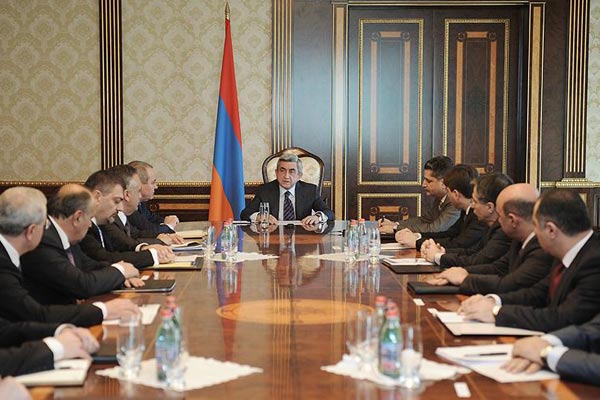
In his wide-ranging instructions to Prime Minister Tigran Sargsyan, Vice-Premier and Local Government Minister Armen Gevorgyan, Central Bank governor Artur Javadyan, the ministers of economy, finance, agriculture, energy and natural resources, urban development, labor and social issues, and other senior officials attending the consultations, the president said tackling inflation must be high on the government's agenda.
“Beginning in May-June our people must be able to feel relief in matters concerning their day-to-day life, people must see the overwhelmingly high prices for food, and especially for agricultural products, returning to the level they are accustomed to. This is the problem that we must solve by all means. In other words, I expect new approaches to solving problems,” emphasized Sargsyan.
His statement on the cost of living in the country came the day after the government unveiled plans to seek amendments in a relevant law that would enable it to impose temporary price caps on some products, such as bread, meat, dairy products and other basic foodstuffs, should they undergo dramatic changes within a short space of time.
In order to encompass the task of checking inflation, Sargsyan said the government and the Central Bank must carry out “more coordinated work” and also take “bold and, why not, also untraditional steps.”
In his remarks Sargsyan also called for a collective effort to assist agriculture, which experienced a major decline last year and dragged down the otherwise positive trends in Armenia’s GDP growth. Sargsyan said raising agriculture should be a matter that concerns not only the relevant ministry. “Each of us must, from time to time, go to the village… I myself will regularly pay visits to the village in order to oversee agricultural matters and will personally keep some programs under control. The results of these programs must be visible and farmers should have the feeling that they are not alone,” stressed Sargsyan.
The president also spoke about his expectations to see a major growth in industry, construction and services and addressed concerns about the rate of the national currency.
“The appreciation of the dram is an unfavorable and unacceptable phenomenon for the economy and domestic producers, and, in my view, such phenomena have been an obstacle to us for a long time. I am sure we will not see such developments. Of course, we all understand that the exchange rate of the national currency is formed as a result of the inflows of foreign currency, and all projections indicate that we will have a slow and steady depreciation of the dram, without any noticeable surges throughout the year. I think this is quite normal and good for our economic agents and, primarily, for exporters.”
Source: http://armenianow.com/economy/28187/serzh_sargsyan_economy_reform
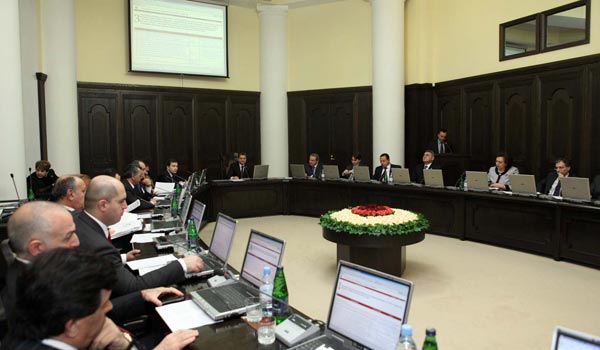
Prime Minister Tigran Sargsyan offers several steps to curb inflation. First, the government has started to support agricultural production. As the prime minister said, the Government will provide seeds for free, primarily in order to help socially vulnerable farmers, and assist in the expansion of cultivated areas in Armenia. In order to develop livestock, more 1,200 heads of cattle had been imported to Armenia and 14 new breeding farms established, he said.
In the context of fighting inflation Sargsyan said the government will send a draft law to the National Assembly for approval which says if the government registers that staples’ prices grow 30 percent within one month, it should have the authority to intervene swiftly and apply regulating prices within 90 days to ease the stir.
The opposition, meanwhile, asks why no steps were made by the government last year when inflation reached dangerous levels. At the rally on March 1, opposition Armenian National Congress leader Levon Ter-Petrosyan demanded the resignation of the prime minister, the president of the Central Bank and other officials within two weeks. He also called for scrapping the unpopular decisions that had led to social protests, in particular the ban on street trade, the introduction of mandatory car insurance, changing in customs regarding the temporary import of vehicles with foreign license plates. The opposition leader also called for raising the minimum wage, unemployment benefits and the average pension.
The State Commission for the Protection of Economic Competition of Armenia cannot work effectively in the current economic system, says ARF Dashnaktsutyun faction MP Ara Nranyan. The State Commission’s head Artak Shaboyan in response says that a bill on amending the Law “On the Protection of Economic Competition” is waiting for a second-reading approval in the parliament and it envisages increasing the power of the regulatory commission and tightening of sanctions against unscrupulous businesses.
Meanwhile, a kilogram of granulated sugar already sells for 400 drams ($1.10) in Gyumri – an abrupt rise in the price of about 20 cents p/kilo. Ruling Republican Party MP Samvel Alexanyan is the Sugar King in Armenia. Will the state meddle in the affairs of monopolists after the adoption of the law?
Economist Tatul Manaserian, who recently tendered a letter of resignation as economic affairs advisor to the parliament speaker, also thinks that monopolization of domestic markets has an immediate impact on inflation. According to the National Statistical Service of Armenia, a 2.8 percent inflation was registered in Armenia in January 2011 as compared to the previous month, which is mainly conditioned by the 4.9 percent increase in food prices. The full-year inflation in 2010 stood at 9.4 percent.
Source: http://armenianow.com/economy/28003/armenia_inflation_monopolies
Armenia Launches World’s Longest Areal Tramway

President Sarkisian, Catholicos Karekin II, other ministers were the first to take a ride along the aerial tramway connecting the village of Halidzor in Armenia’s Syunik province with the ninth-century monastery of Tatev, one of the country’s most important religious centers and a major tourist attraction. The new tramway will function throughout the year and will allow visitors to bypass a grueling 90-minute drive in and out of the rocky Vorotan River Gorge.
At the opening ceremony, Sarkisian said the link was of “exceptional importance for Tatev and the surrounding region” and praised the project for overcoming the many difficulties involved in construction. “This cable car line shows that even dreams that seem unrealistic can be realized with faith and purpose,” he said. The monastery of Tatev is among the oldest and most prominent monasteries in Armenia. A UNESCO World Heritage candidate, it played an important role in the life of the region as its major spiritual, political, cultural and educational center.
Because of its architecture, its history and its spectacular natural setting, it is also an invaluable asset with the potential to catalyze tourism development in the region. Karekin II said the launch of the link was an important step in restoring access to “a centuries-old holy shrine which was a place of pilgrimage from apostolic times.” “Through its beauty and stunning construction the monastery at Tatev is among the exceptional creations of Armenian architecture which for centuries has been a vibrant center of Armenian spiritual life, science and culture,” the Catholicos said.
The reversible cable car line cost 18 million dollars (13 million euros) with much of the funding coming from private donations, according to the National Competitiveness Foundation of Armenia, which oversaw the project through its Tatev Revival Project. It runs from the village of Halidzor near a highway connecting the Armenian capital Yerevan to the village of Tatev, within walking distance of the monastery.
The cable car travels at a speed of 37 kilometers per hour (23 miles per hour) and a one-way journey takes 11 minutes. At its highest point over the gorge, the car travels 320 meters (1,056 feet) above ground level.
It has two cabins, each capable of carrying up to 25 passengers. Local residents will be able to ride the cable car for free while others will have to pay 3,000 Armenian drams (eight dollars/six euros.)
An ex-Soviet republic bordering Turkey, Iran, Azerbaijan and Georgia, Armenia is keen to develop its tourism industry, showcasing its history as the first country to have adopted Christianity. Residents said they hoped the new link would help restore the economy of the local area, which like much of rural Armenia has suffered from deep poverty and an exodus of young people looking elsewhere for work. “I hope the opening of this cable car will help revive tourism so that there are new hotels and new jobs and so that the young people who have been leaving for Russia or other countries will instead stay home and work here,” said Armais Minosian, an 80-year-old local villager.
The cable car is part of a 50-million-dollar (36-million-euro) public-private effort to develop tourism at Tatev and in the surrounding region, one of the traditional 15 provinces of the ancient Kingdom of Armenia. The Tatev Revival Project will leverage the monastic and touristic significance of the complex to develop the region into an attractive destination nestled in a prospering local community. The project consists of several components: conserving the monastery, reviving its monastic and scholarly traditions, and developing tourism in the adjacent river gorge and six local communities.
The project has also seen the government renovate 26 kilometers (16 miles) of the highway from Yerevan to Tatev and the restoration of parts of the monastery complex. The Sandia Peak cable car in the US state of New Mexico, which runs 4.3 kilometers (2.7 miles), had previously billed itself as the world’s longest cable car line.
Source: http://asbarez.com/86923/
Good News for Consumers: Presidents strike deal to curb blue flame price hike
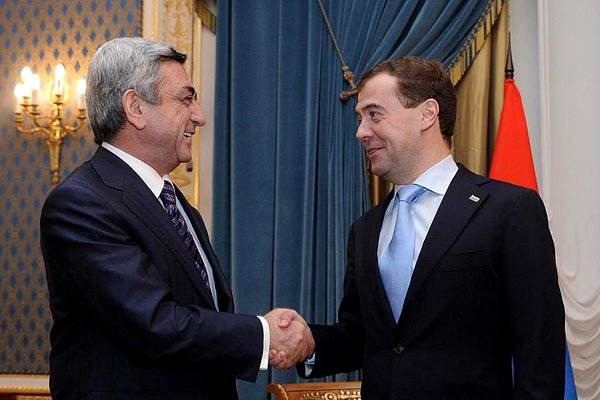
Following the September notice the Armenian Pubic Services Regulatory Commission approved a 37.5 percent increase, which has now been curtailed by the St. Petersburg agreement.
Source: http://armenianow.com/economy/27928/armenia_russia_gas_price
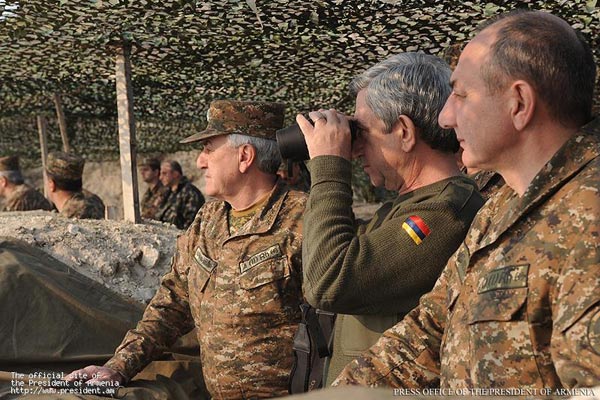
The president of Armenia, who was in Nagorno-Karabakh on a working visit, and attended the military exercises of the defense army of the Nagorno-Karabakh Republic on late Friday (November 12), stated that the Armenian side is not planning to attack first, but if necessary, the counter-offensive will be conclusive. This statement of Sargsyan may be considered as a response to Azerbaijani President Ilham Aliyev’s recent threats, voiced at the funeral of Azeri servicemen (who were killed in recent fights), saying that they “would apply to military means.”
On November 7, Aliyev announced that Azerbaijan would negotiate as long as there was hope that they (Azeris) would manage to recover the territorial integrity (of Azerbaijan). “If we see that it is impossible, then Azerbaijan will recover its territorial integrity by military means,” Aliyev said.
In response to these statements, Sargsyan said: “The military drills, which were maximally close to military actions, must serve as a warning to others. If the moment comes, we will not only be able to repeat what we did in 1992-1994, but we will settle the problem once and for all, the issue will be closed once and for all.” Karabakh military drills (November 1-14) were held near Aghdam. It is noteworthy that the military exercises coincided with Aliyev’s visit to the Azerbaijan-controlled part of Aghdam district.
Source: http://armenianow.com/karabakh/25832/sargsyan_karabakh_military_exercises

Foreign investments in Armenia in 2009 totaled $935.5 million, of which direct investments were $732.1 million. As compared with 2008, foreign investments decreased by 25.6 percent. According to the National Statistical Service, for the first nine months of 2010 the amount of foreign investments in Armenia totaled $472.2 million.
After visiting the RAO Mars complex, which is one of the enterprises transferred to Russia as part of the “equities for debt” deal, Armenia’s Economy Minister Tigran Davtyan said the plant will become one of the first free-trade zones in Armenia. The potential for creating a total of four free economic zones in the country is being considered. The minister also said that a number of foreign investors will visit Armenia in spring to get acquainted with the potential of free trade zones.
The Armenian Development Agency is also planning to directly attract investments of $20 million in 2011, against $4.5 million attracted in 2010. Meanwhile, Armenian capital gradually began to seep through into neighboring Georgia where a liberal tax environment has been created. According to Georgian data, more than 100 Armenian enterprises have been registered in Georgia over the past several months.
Commenting on the flow of the Armenian capital to Georgia, Armenian Prime Minister Tigran Sargsyan said that with his Georgian counterpart, who recently visited Armenia, they reached an agreement on creating an enabling environment for the two countries’ markets to be common and the economies to be more integrated. The joint meeting of the collegium of the Ministry of Economy and the Union of Industrialists and Employers on February 22 discussed measures that could not only stimulate the inflow of investments but also would stem the outflow of the Armenian capital.
Recently, there have been allegations about intentions by well-known Armenian businessman, head of the Grand Holding Hrant Vardanyan to transfer his production of tobacco and confectionery from Armenia to Georgia. At his company it was not denied that the businessman was interested in Georgia, but said that the matter did not concern his winding up his business operations in Armenia, but rather about its expansion.
How will the measures being taken reflect on the investment climate and, more importantly, what will be the quality of the attracted investment? Indeed, in recent years, Russia has remained the major investor in Armenia and it has preferred investing in communications rather than production. American investment is nearly stopped, although in the early years of Armenian independence American-Armenian businessmen would invest large sums in real production. Judging by the government steps aimed at further rapprochement with Russia, the return of Western business can hardly be expected.
“A free trade zone will be operating in CIS countries on a multilateral basis,” said Economy Minister Davtyan. “The matter concerns the presence of a common free trade zone between all countries of the CIS.”
Russia still remains the largest investor in Armenia, it accounts for 54 percent of foreign investments. France is in second place thanks to investment by France Telecom.
Source: http://armenianow.com/commentary/analysis/27848/government_foreign_investment
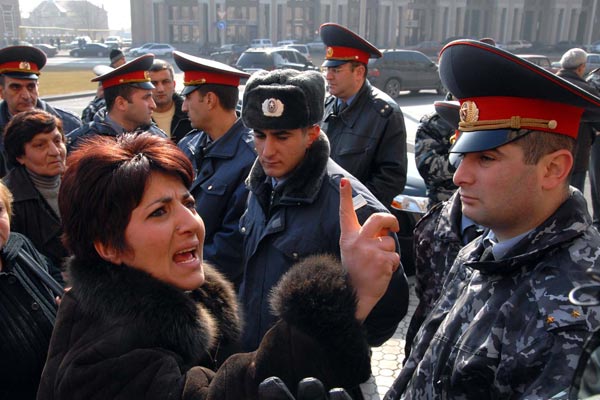
The vendors, who may lose their only source of income organized protests against the decision; armed with posters (saying “Mayor, people haven’t chosen you!” “Do not deprive us from our bread!” etc.), they held pickets at the mayor’s office for several days. “Let them provide us with jobs and then not allow us to do our business. What shall we do? How shall we take care of our children?” one of the picket participants says angrily. Hovhannes Ghalechyan, chief specialist at the Department for Trade and Services of the Yerevan Municipality, told journalists that they simply applied the law.
“The social factor cannot be brought as reasoning to justify something prohibited by the law. Open air vending is not only banned by the law, but it also harms people’s health. Maybe it is not profitable for them [vendors] to move, because it is economically more profitable to sell goods on pavements. They do not pay a tax for the territory; they may pay taxes as an economic entity, but it does not mean that vending can be held anywhere,” Ghalechyan says.
He adds that the municipality has offered other possibilities to the vendors. “All those people who have trade centers must collect their goods from streets and mover there. People who sell construction materials can move to the corresponding market – an arrangement with its director is already achieved. Other vendors must move to a market, too. If there is a demand, the municipality will found additional markets,” Ghalechyan says.
However, participants of the picket say that vending in markets is not profitable, because they must pay additional taxes. According to the municipality data, there were 3,000 street vendors in Yerevan, but street vendors say that their number exceeds 10,000. A 51-year-old woman, wearing a shabby jacket and shoes in this cold winter, sells snowdrops and violets on Amiryan Street, Yerevan. She said that she had no alternative, and that she could not be law-abiding.
“If police officers tell me to collect my shop, I move a little bit forward [meaning she changes her place],” she says. Her ‘shop’ is a small square table put on a child bicycle’s wheels. “I have no other way out, I have no job for more than ten years, so I deal with this [selling flowers].”
The woman told ArmeniaNow that she gets averagely 5,000 drams ($14) daily. “I have a sick daughter and I rent an apartment, paying 45,000 drams ($126) per month, so I cannot quit this job,” she says. The previous mayors of Yerevan, soon after getting the position, started struggling against street vending, however, that struggle was temporary.
Source: http://armenianow.com/economy/27155/mayor_ban_street_trade_yerevan
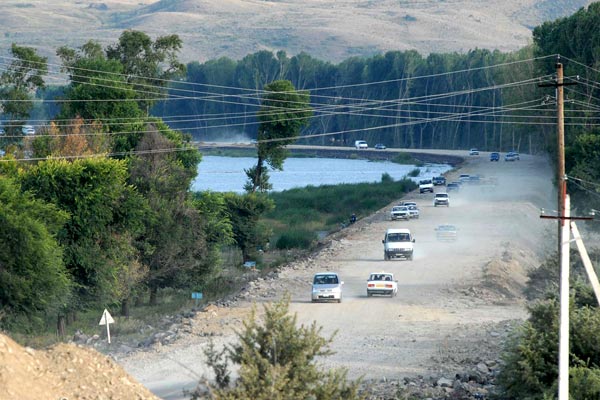
Source: http://armenianow.com/economy/28115/iran_transport_armenia
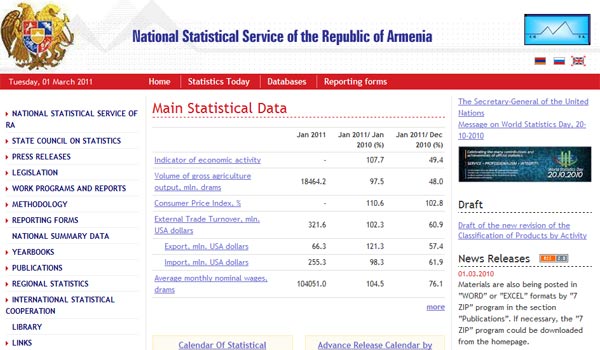
Source: http://armenianow.com/economy/27953/armenia_january_2011_trade
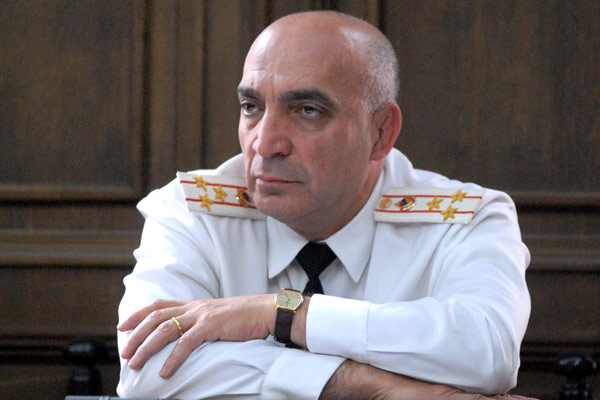
The decision came as a sensation since in Armenia this is perhaps the first “nonpolitical” arrest of a high-ranking police officer in many years. Interest in this case increased after the consultations that President Serzh Sargsyan held on March 14 with police, where he said that people cannot trust the police if the police turn away seeing an offense. Then he also said: “The whole public knows that a murder occurred, knows who committed the murder, and yet police officers distorted the case, alleging that it was committed by someone else. Instead of you, I feel ashamed. If you treat the system seriously, uou should have been the first to come forward and say to that high-ranking policeman, ‘Why are you putting our system to shame?’”
Then it was clear to everyone that Sargsyan implied Tamanyan relieved of his post the day before. He is charged with deliberate distortion of factual circumstances of a murder committed on May 12, 2010, in which “the citizen who committed murder was summoned only as a witness, thus avoiding criminal responsibility.” It is said that it was on the direct orders of Tamamyan that a nephew of the parliament speaker’s advisor Hovhannes Shahinyan was framed for that murder.
Media are already saying that had that not been a fabrication against the relative of an influential man, Tamamyan likely would have continued to work and thus press publications note “selectivity” with which the authorities approach the punishment of officials. In particular, in late 2010, Justice Minister Gevorg Danielyan was sacked supposedly for failing to punish one of his high-ranking subordinates allegedly involved in violent conduct. The minister was sacked, but the chief of the bailiff service still continues to work, which raises doubts in society.
The press is closely following another controversial case: last December head of the State Service of Social Welfare Vazgen Khachikyan was dismissed from his job. He was fired without accusations, although before that the Control Chamber had revealed glaring instances of pension payments to 50,000 dead people, essentially meaning that those sums had been embezzled by the system. Chairman of the Control Chamber of Armenia Ishkhan Zakaryan did not mention the total amount of misappropriations, but promised to disclose it until June.
Will society believe in the sincerity of reforms in the law-enforcement system if senior officials are convicted and punished? Experts say it depends on whether these trials are “selective” and whether the authorities manage to cease “discriminating” between criminals. Meanwhile, Heritage party representative Ruben Hakobyan called the current parliament “a center for coordinating crime”. “Beautiful speeches by Serzh Sargsyan cannot be translated into action, because they go against the interests of criminals who sit in Parliament,” charged the oppositionist.
Source: http://armenianow.com/commentary/analysis/28559/armenia_police_general_arrested

The first Russian-Armenian exhibition of industrial innovations will take place in March 2011 in Armenia in the frames of Russian-Armenian forum, said the Head of Representation Office of “Rossotrudnichestvo” (Russian Cooperation) Victor Krivopuskov during the seminar “Innovation policy and commercialization of the results of scientific activity”. “The exhibition of industrial innovations will allow to make drastic changes in mutual cooperation in 2011”, said Krivopuskov. Today more than 70 Russian companies make deliveries of goods and services in Armenia, of which about 30 work in the frames of agreement with Armenian regions and 20 – develop these relations by state support from Russia and Armenia. Companies working on innovation basis will participate in the exhibition which will play a great role in innovation development in Armenia, particularly in the sphere of small and medium-sized business development. Krivopuskov said that Russian-Armenian Center of Innovation Cooperation received already 50 applications, of which 15 is selected and nine have been already reviewed and submitted to the high management bodies for approval. “This mechanism will promote monitoring, development and advancement of innovation projects in Armenia up to the phase of commercialization”, he said. Foreign trade turnover of Armenia with Russia increased by 10.6% in January-October 2010 compared with 2009 making 793.3 million US dollars.--0--
Source: http://www.arka.am/eng/economy/2010/12/07/22870.html

“Our country wakes up every morning to see the biblical Ararat. The Ararat is first of all a symbol of revival. Now, after the global financial crisis, it is obvious for us the world cannot be the same as it was before. It must change. In different parts of the world people are seeking to form a new world order. Our principal slogan today must be our duty to create a new world together. That is the reason for our idea of New City, which will not only present our notions of a dialogue between civilizations, but also create opportunities for all the people to take part in the constriction,” Premier Sargsyan said. According to him, Shanghai ExPo – 2010 is an opportunity for cooperation and a civilized dialogue. The Armenian Premier invited everybody to take part in constructing a new city in the Ararat land. He expressed hope that the construction will open a new chapter in the human civilization’s history.
The Armenian delegation also visited the Armenian and Chinese pavilions at the exhibition. Over 2m of more than 53m people that have visited the Shanghai ExPo – 2010 exhibition have taken interest in the Armenian pavilion. More than 20,000 people visited the Armenian pavilion daily. The steering committee gave a high mark to the Armenian pavilion and its computer version. Shanghai Mayor Han Zheng thanked the Armenian Premier for visiting the city and for Armenia’s participation in the exhibition. Premier Sargsyan stressed the importance of Shanghai’s urban development experience and invited Mr. Han Zheng to visit Armenia, get acquainted with Armenian construction and architectural traditions an exchange urban development experience.
Source: http://news.am/eng/news/31684.html

Source: http://armenianow.com/economy/25835/government_assistance_young_families_mortgage_loans

Source: http://asbarez.com/85629/shanghai-expo-marks-armenia-pavilion-day/


Nine military industrial companies will be created within the framework of military cooperation between Armenia and Russia, the part of which will involve large financial industrial holdings specializing in this field. It will significantly open up opportunities of the existing Armenian companies and will serve as a solid basis for further development in this direction, Arthur Baghdasaryan, Secretary of the Armenian National Security Council, said at today’s press conference. “This program is also socially useful as it will create new jobs in the country,” he added.

Armenian government considers crackdown on corruption among its police’s key focuses between 2008 and 2012. The government says in its action program sent to National Assembly for approval that multiparty system formation is the main condition for effective struggle against corruption. The government also says in its program that it will work out a new anti-corruption strategy to protect human rights and fundamental values as well as to improve state and local governance institutions’ activity. According to the document, the government will inform the community about the course of its crackdown on corruption and involve civil society in the process. The government also intends to involve the community in state governance, make favorable environment for fair competition among economy entities and shadow economy reduction. The government attaches great importance to justice system reformation including new codes elaboration and approval. New courts will be built as part of the justice system reformation. The unit in charge of investigation is planned to be moved from Prosecutor Office to another Armenian National Statistical Service governing institution and provided with financial and technical means.
Source: http://arka.am/eng/economy/2007/06/26/1773.html

Karapetian, who has led the Armenian-Russian joint venture ArmRosGazprom since 2001, was nominated for the top city post by the Republican Party of Armenia (HHK). In what was largely a rubberstamp vote by the Council of Elders, an elected body of representatives in Yerevan, Karapetian won the backing of 50 assembly members, with only one voting against. On the eve of the vote, the HHK leadership also approved several changes in the government at Sarkisian's suggestion. Those included the replacement of Economy Minister Nerses Yeritsian with Finance Minister Tigran Davtian and appointing Central Bank Deputy Governor Vache Gabrielian as the latter's successor.
The HHK board also approved Sarkisian's nomination of prominent law expert Hrair Tovmasian as justice minister. The position had remained vacant since December 9, when the president fired Gevorg Danielian for what the government described as his failure to punish one of his high-ranking subordinates allegedly involved in violent conduct. The ministerial portfolios in question belong to the HHK under its power-sharing deal with two junior coalition partners. Talking to RFE/RL late on December 16, HHK spokesman Edward Sharmazanov said the changes were aimed at "raising the efficiency of the government's work."
Source: http://www.rferl.org/content/yerevan_mayor/2251426.html
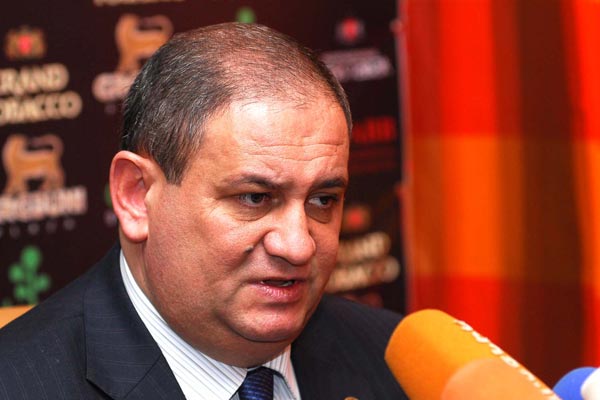
Source: http://armenianow.com/economy/26754/armenia_agriculture_minister_fired
A 33-year-old legal assistant to President Serzh Sarkisian was appointed as Armenia’s new chief military prosecutor and introduced to his subordinates on Thursday. The official, Gevorg Kostanian, had served as deputy minister of justice before joining the presidential staff in 2008. He has also represented the Armenian government at the European Court of Human Rights in Strasbourg since 2004.According to his official biography released by Sarkisian’s press service, Kostanian began his career at the age of 18 when he was employed by the Justice Ministry as a “first-class counsellor.” He was a first-year university student at the time. Prosecutor-General Aghvan Hovsepian praised Kostanian’s “extensive work experience in the legal-judicial sphere” as he presented the new military prosecutor to his staff. Hovsepian said he expects to Kostanian to carry out “reforms” in the Military Prosecutor’s Office and step up its oversight of criminal investigations into crimes committed by military personnel. Such investigations are conducted by the Investigative Service of the Armenian Defense Ministry. It was not immediately clear if Kostanian’s appointment was connected with a recent spate of non-combat deaths and other violent incidents within the Armenian army ranks. Defense Minister Seyran Ohanian has repeatedly pledged a tougher crackdown on army crime. Hovsepian claimed that military prosecutors’ peformance “improved considerably” under Kostanian’s predecessor, Armen Khachaturian. Sarkisian’s office gave no reasons for Khachaturian’s dismissal.
Source: http://asbarez.com/90842/sarkisian-tells-armenia-media-to-avoid-%E2%80%98falsifications%E2%80%99/comment-page-1/#comment-3541

Source: http://www.azatutyun.am/content/article/2183990.html
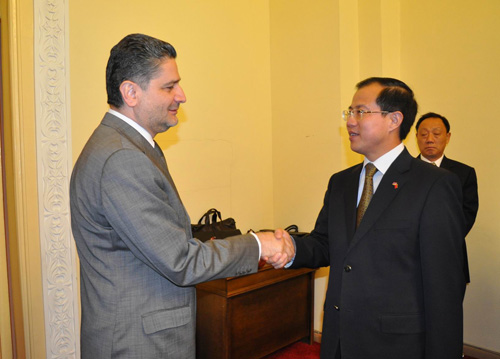
China will consider Armenia’s proposal on participation in the construction of Iran-Armenia railway, Armenian Premier Tigran Sargsyan said in the course of his visit to Shanghai ExPo 2010. The Armenian side has presented China a number of projects, such as basalt reprocessing factories, production of solar batteries, etc., RA governmental press service informed NEWS.am. The sides also stressed importance of the opening and operation of Shanxi-Nairit joint venture. In the course of bilateral talks it was decided to discuss the projects at the forthcoming session of the Armenian-Chinese intergovernmental commission to be held in Yerevan. Tigran Sargsyan noted that over 2 million people visited the Armenian pavilion at Shanghai ExPo 2010 and it was recognized one of the best.
Source: http://news.am/eng/news/31849.htm
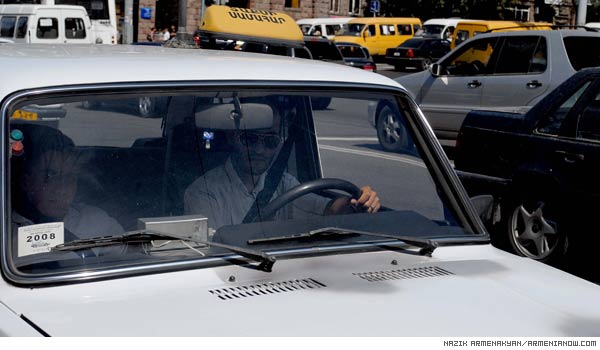
At his Cabinet meeting on August 13, Prime Minister Tigran Sargsyan ordered the Police to enforce what has long been the requirement of Armenia’s traffic rules but never practiced on the roads. “Traffic safety in Armenia is not appropriate. Our statistics on road-accident deaths shows figures several times higher than those in other countries. The failure to keep traffic safety regulations is the main reason,” said the premier, describing the practice of motorists not to wear the seatbelt as “bragging of impudence”. The government has also approved a national strategy of road safety in Armenia and the city of Yerevan as well as a five-year action plan to implement this strategy. The effort is expected to reduce the rate of fatality on the roads by ten percent within five years.
A total of 867 road accidents were registered in Armenia during the period of January through June this year, with 150 deaths and 1,218 injuries. (In 2008, road accidents killed 39,000 people in the nearly 500-million-strong European Union. Compare: 407 deaths in road accidents in Armenia with a total population of about 3 million during the same period. (I.e. the death toll in Armenia was about twice as high percentage-wise). The failure to wear the seatbelt is penalized with a fine of 5,000 (about $13), whereas having no seatbelt device installed in the vehicle will cost the offender $20,000 (about $53).
Road Police Chief Margar Ohanyan told reporters on Monday that road inspectors penalized 1,300 offending drivers during the past month. He reaffirmed the police determination to enforce the new driving culture, saying that “it is not easy [for motorists] to pay 5,000 drams every time for failing to buckle up.” While most Armenian drivers seem to have “put up” with the new reality, some continue to complain. Veteran taxi driver Sashik Vardanyan says he has no problem with wearing the seatbelt, but complains that it “confuses the passengers.”
“Many people feel restrained this way. They say they aren’t dogs to be restrained. When I ask my passengers to wear the seatbelt, many simply leave the car. I’ve lost at least 15 customers this way in the past two weeks or so,” says the cabdriver. (Under the traffic rules, it is drivers that get fined for the offences of their passengers, including the failure to wear seatbelts, unless police manage to establish the identity of the offenders. People in Armenia are not required to carry passports or other IDs for immediate identification purposes). Another driver, Samvel Ispiryan, says it is pointless to wear the seatbelt within the city where speed limits prevent motorists from driving fast anyway.
Meanwhile, head of the “Achilles” Center for the Defense of Drivers’ Rights NGO Eduard Hovhannisyan hails the enforcement of the rule. “Better late than never,” he says. Hovhannisyan, who is more often heard to criticize the police, this time praises their effort, but warns that consistency is needed to achieve long-term improvement. “Simply, our people now must learn that rule and wearing the seatbelt must become a habit,” says Hovhannisyan.
Source: http://www.armenianow.com/hy/node/10358
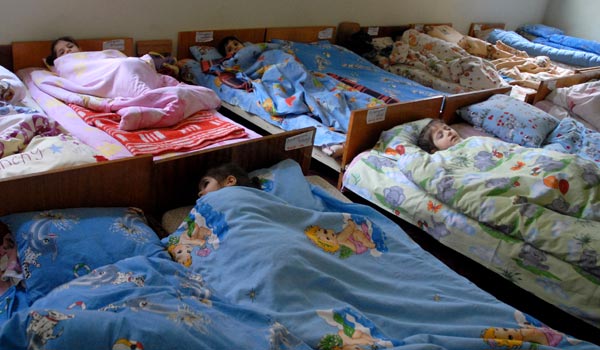
Source: http://armenianow.com/social/28296/yerevan_municipality_kindergartens_free

The National Assembly approved the bill by 90 votes to 0, with one abstention. The amnesty is expected to result in the quick release of some 400 prisoners, which is equal to roughly 10 percent of the country's entire prison population. Among them will be four members of the opposition Armenian National Congress (HAK) jailed in the wake of the protests that followed the disputed February 2008 presidential election.
The vote sparked deadly street clashes in Yerevan between security forces and opposition protesters. More than a hundred supporters of Levon Ter-Petrosian, the HAK leader and the main opposition presidential candidate, were arrested in the following weeks. The amnesty law will take effect the day after it is signed by parliament speaker Hovik Abrahamian and formally published. Abrahamian must sign the bill within 24 hours. Asked when the opposition figures and other detainees will be set free, Justice Minister Hrayr Tovmasian told RFE/RL's Armenian Service: "We have to see when it will enter into force. We still have 22 hours to publish the law." "The clock will then start ticking," he added.
Some parliament deputies from Sarkisian's Republican Party of Armenia (HHK) predicted that the most prominent of the jailed oppositionists -- Nikol Pashinian, editor of the newspaper "Haykakan Zhamanak," and former parliament deputy Sasun Mikaelian -- will be freed before the HAK's next rally in Yerevan, which is scheduled for May 31. In addition to the release of all "political prisoners," the HAK is insisting on the lifting of a de facto government ban on opposition rallies in a key Yerevan square and a renewed investigation into the 2008 unrest. The Armenian authorities effectively met those demands late last month.
HHK spokesman Eduard Sharmazanov said on May 26 that the amnesty will facilitate "internal political dialogue." The HAK says that it will negotiate with the government only on the conduct of pre-term presidential and parliamentary elections, its main stated goal. The government and its political allies have repeatedly ruled out the possibility of early elections. "We are attentively watching developments," said senior HAK representative Levon Zurabian. "We see that efforts are being made to free the political prisoners."
Zurabian said the HAK will announce its next steps at the May 31 rally. "One thing is already clear: we have achieved a serious success," he said. "It is also clear that this is creating a new situation that allows us to fight for the establishment of a legitimate government in Armenia without [risking] upheavals."

“Military-industrial cooperation with Armenia is one of the priority areas of CSTO activities,” the Regnum news agency quoted Bordyuzha as telling journalists. He said “practical steps” already taken in that direction will bear fruit soon. “We will soon be monitoring the realization of agreements that were reached today,” said Konstantin Biryulin, the deputy head of Russia’s Federal Service for Military-Technical Cooperation with foreign states.
According to Artur Baghdasarian, the secretary of Armenia’s National Security Council, the agreements envisage, among other things, the establishment of Russian-Armenian defense joint ventures. He did not elaborate. The three men spoke at a joint news conference after two days of negotiations that also involved Defense Minister Seyran Ohanian. Bordyuzha and Biryulin visited four Armenian plants manufacturing weapons and other military equipment on Monday. Biryulin and other officials from his agency already visited Armenia last December for a session of a Russian-Armenian inter-governmental commission on bilateral military-technical cooperation. Under an agreement signed during the meeting, Russia and Armenia will work together in exporting arms and ammunition to third countries.
The military alliance with Russia and, in particular, the presence of Russian troops on Armenian soil has been a key element of Armenia’s national security doctrine since independence. Armenia has been entitled to receiving Russian weapons at cut-down prices or even free of charge also because of its membership in the CSTO. “In my opinion, the possibility of purchasing Russian weapons is the main privilege given to CSTO members states within the framework of military-industrial cooperation,” Ohanian told the Interfax news agency on Tuesday. “I will not hide the fact that we pin big hopes on this sphere of activity.”
Source: http://asbarez.com/83513/armenia-russia-discuss-closer-defense-industry-ties/
Mr Sargsyan, Vladimir Putin once described the collapse of the Soviet Union as the “greatest geopolitical catastrophe of the century.” What was this catastrophe for you – a tragedy or a victory?
I think that for a large number of people, the Soviet Union’s collapse was a tragedy because they lost a familiar life and apparent prosperity and had to abruptly change their lifestyles. Enormous efforts were required to ensure their security. With the Soviet Union’s disintegration, existing tensions escalated into armed actions, or to put it bluntly, into war. However, many nations were dreaming of independence and having received it, they translated the dream that many generations had had through the centuries into reality.
Independent Armenia is only 20 years old, which is a very short span of time in Armenian history. Armenia lost its independence centuries ago, and the two and a half years of the first independent republic is just a moment in history. Soviet Armenia was a very important stage in our national history, a period when the nation’s collective memory was taking shape. This is what allowed us to hold our ground.
Are you saying that the foundation that helped you to hold out after the Soviet Union’s collapse was laid in Soviet times?
Yes. This foundation was rooted in our economy, demography, culture, science and the formation of our nation’s institutional memory.
Was Soviet history generally good or bad for Armenia and its people?
Just as every other Soviet nation, Armenians had to share a common fate with all the problems that the Soviet Union faced. On the whole, I think there were many more good events than bad ones. Armenia was developing and the Soviet status of Armenia in 1988 in no way compares to what it was in the pre-Soviet period. I think that Armenia was moving ahead pretty quickly.
Do you agree with those who claim that Armenia had a privileged position in the Soviet Union?
Did it? I don’t think so. The Armenian people are hard-working and purposeful. To be honest, I have never heard such an opinion.
You have mentioned many positive factors in Armenia’s Soviet history but why was Armenia one of the starting points for the Soviet Union’s disintegration?
There were two major reasons for this. First, despite Armenia’s steady progress, we did have a nationality issue. We lived in a large country that did not always consider our interests in its foreign policy, for instance, in bilateral relations with Turkey. Armenians were scattered all over the world primarily because of the genocide against them. In Western societies, Armenians could express themselves freely on this score. We heard about this talk and it influenced us. The official policy evoked a very negative response in Armenia.
Second, at the dawn of Soviet power, the Soviet Communist Party’s Caucasian Bureau decided to separate the historical regions of Nagorny Karabakh and Nakhichevan from Armenia and transfer them to Azerbaijan. We have never accepted this, primarily in Nagorny Karabakh. The people of Karabakh have constantly protested this illegal decision. This protest became more pronounced with Gorbachev’s perestroika. When people saw that they were unable to achieve justice, they made a noise.
When did you realize that the Soviet Union was doomed?
It’s hard to recall now when exactly I realized this, but since 1988 I was actively involved in the Karabakh movement. Being a party worker at the time I understood that this movement was forever, that we must go all the way or not a single Armenian would be left in Karabakh just like in Nakhichevan. I quit the Soviet Communist Party. Of course, I realized that independence would not be easy, that losses were inevitable. I understood our region and we were ready to face any difficulty.
And do you remember the day when you realized that this was the end? We all hoped for some time that we would preserve the unity and resolve our problems within one country but then it became clear that this was it, that we will part and take independent paths, no mater what.
I think it was near the end of 1990 when we learned that the interior troops would leave Nagorny Karabakh. On the eve of this pullout we realized that we’d have to deal with our problems ourselves and that turmoil was ahead.
Even so, everything started with Nagorny Karabakh. This was when the Soviet Union began to disintegrate. What is the ideal solution to this problem now?
This problem can be resolved only by compromise. We have been searching for it all these years, but the bottom line is that the people of Nagorny Karabakh must decide their destiny themselves and must have every opportunity for secure development on their historic land. The OSCE Minsk Group is dealing with this issue. President Dmitry Medvedev is doing much in this respect and we are most grateful to him for his efforts. It was the Minsk Group that suggested a document that was dubbed the three Madrid principles – non-use of force or its threat, territorial integrity and the right of peoples to self-determination. This document makes it possible to continue the talks and start drafting a comprehensive peace treaty.
We understand very well what these three principles mean. After long deliberations the Azerbaijanis also accepted them, but their interpretation is peculiar. Up to this day, the Azerbaijani government has threatened to resume military action at every level. This is a violation of the first principle. Both we and they understand the principle of territorial integrity but they have elevated it into an absolute dogma outside the context of international law. They interpret the right to self-determination only within the context of their territorial integrity. But this is not self-determination. This is truncated, primitive self-determination. Therefore, it will be very difficult to resolve the issue unless Azerbaijan understands the essence of this principle. Karabakh has upheld its independence in a bloody, severe war, in extremely hard conditions and it would be naïve to assume that its people will give up what they have achieved.
But if the two countries interpret the principle of territorial integrity differently, if they draw different borders on the map, progress is most unlikely isn’t it?
I think we do understand this principle differently. But this is one of the principles by which the world is guided. These principles – territorial integrity and the right to self-determination have enabled both Azerbaijan and Armenia to become independent. So, why are they accepted in one case and rejected in the other? This is contrary to logic. Territorial integrity does not mean the inviolability of borders. Otherwise, we wouldn’t see the emergence of new countries. Dozens of them have appeared on the world map in the past 20 or 30 years.
Do you think the recent emergence of two new states in the South Caucasus will reflect on the Karabakh settlement?
The Karabakh issue is different from other similar issues. In general, all of these conflicts are different, and each has its own roots, consequences and dynamics. As a precedent, the formation of new states facilitates the international attitude towards the rights of the people of Nagorny Karabakh. And what matters is not whether we recognize the state sovereignty of Kosovo, South Sudan, Abkhazia or South Ossetia but that the international community accepts to a different extent that under certain conditions cessation is a legal form of implementing the right to self-determination.
Is there a high risk of hostilities being resumed?
I think there is a risk because I’m unable to understand why Azerbaijan is dragging out the negotiating process so much. Apparently, there are plans to build up power for a new military adventure at a convenient time. This is the wrong approach because events would develop in one of the two ways. The first would be an all out war and the subsequent occupation of Nagorny Karabakh, which is possible only in case of complete annihilation of the people of Nagorny Karabakh. The other would be an Azerbaijani defeat with the loss of territory, in which case it would complain about the loss of five or six or more regions. And what would come next? Another truce, agreements, ceasefire violations and another war… All these scenarios have no future.
Does Armenia consider the possibility of recognizing Nagorny Karabakh?
Of course it does. We are bound to consider this possibility. It could emerge if hostilities resume. People often ask a more straightforward question: “Why doesn’t Armenia recognize the independence of Nagorny Karabakh?” This is because we are involved in talks and a recognition would put an end to them. It is still better to conduct the talks.
You are the third head of state in Armenia. What has the country achieved in 20 years and where has it failed?
Our biggest achievement is the preservation of stability in our country. We’ve been through hard times. We had to convert our economy from a state planed economy to a free market economy while securing the safety of the people. Azerbaijan unleashed a war; Turkey unreservedly supported Azerbaijan; and a civil war was raging in Georgia. Under the circumstances it was very difficult to provide the people with the basic necessities. We had huge problems with power supply. We had to do all this after a devastating earthquake that left hundreds of thousands homeless. Plus, almost half a million refugees fled to our tiny Armenia to avoid death. So, preserving stability was our biggest achievement.
Leaders are always tempted to criticize their predecessors. As they say, “it is easy to imagine yourself a strategist when you are not involved in the battle.” I became the country’s leader in 2008 and have always tried to avoid this approach. Criticizing your predecessors means shifting the responsibility to others. This is wrong. I’m grateful to my predecessors and to all those who have done something good for Armenia.
A common problem for all post-Soviet republics is forming a self-identity. Has independent Armenia achieved this? Are Armenians still a divided nation or have they acquired their own sense of home?
For the overwhelming majority of Armenians, Armenia is not simply a historic homeland, although two thirds of them live abroad and almost all are nationals of their resident countries. It would be unfair to say that they do not have grievances against their historic homeland. Armenians easily integrate into their countries of residence. Maybe, this is why they are so successful in different fields. Regrettably, we have been unable to fully use their potential so far. I have tried in vain to understand this problem for many years. I’m sure that in the future we’ll make better use of this enormous resource because people are our biggest asset, including those who live outside Armenia.
Can you achieve full economic growth without resolving the obvious geopolitical problems, in particular, without settling your relations with Turkey?
This question does not have an unequivocal answer – “yes, we can” or “no, we can’t”, because if it is “no” then why have we developed for 20 years and if it is “yes” then why are we developing at such a pace? Needless to say, we won’t die of hunger if we do not settle our relations with Turkey. But let me repeat what I’ve said many times – we do not consider economics to be the main reason to normalize relations with Turkey. As Napoleon used to say, “A country’s geography makes its history.” Geography is a verdict, a country’s destiny.
We live here and must maintain at least some relations with our neighbors but not at all costs – by no means. When we started normalizing relations with Turkey, many opponents warned us that it would prevent the acknowledgement of genocide all over the world. Fortunately, these predictions have not come true. The genocide is an indisputable fact and we must do everything we can to compel Turkey to admit it. This is our struggle for justice, for security. In the final count we are working to make such crimes inadmissible not only in our region but also in the rest of the world.
Soon it will be a hundred years since this tragedy, which happened in 1915. Is it possible to diminish its role in your bilateral relations?
Reconciliation can only start when Turkey acknowledges this genocide. There can be no reconciliation without this step. It would be wrong to assume that our attempts to establish relations with Turkey are aimed at reconciliation. Genuine reconciliation is only possible after repentance.
Do you think that the Collective Security Treaty Organization (CSTO) reliably ensures the security of the Armenian borders?
Well, we are actively cooperating with other CSTO members. There are complete legal grounds for collaborative efforts of CSTO members. We are convinced of this.
CSTO is one of the bodies that the leaders of post-Soviet republics tried to establish to retain some unity. Are there any other spin-offs from common Soviet history?
Of course, there are lots of them.
Could you name some?
Our relations, the glorious traditions we established together, the history of combat brotherhood and friendship. After all, the acquisition of independence does not mean the break-up of friendly relations. I consider our current relations with Russia very good. I don’t even know when they were better – now or in Soviet times.
What do you think about the change in Russia’s role in the South Caucasus? What does this mean for Armenia?
Russia is a key player in our region, as far as security is concerned. Very much depends on Russia. But we have never hoped that Russia would occupy an adamant pro-Armenian position. After all, Russia is a large country and Azerbaijan is also one of its neighbors. Therefore, Russia cannot unequivocally support one side in the conflict like Turkey does with respect to Azerbaijan. However, Russia is our ally in CSTO and if hostilities resume or our security comes under a serious threat, Russia has both commitments and opportunities to react.
Source: http://en.rian.ru/analysis/20110521/164145110.html

He said 85% of the grain crops this year have already been harvested. Karapetian also emphasized that the grain prices on world markets have fallen by 15-20%, but the drop is not felt in Armenia because earlier imported stocks at higher prices are not over yet. Armenia annually consumes up to 650,000 tons of food grains and relies on import for nearly two thirds of its grain consumption. The minister said also production of vegetables has increased and by the end of the year about 750,000 are expected to be gathered.
Apricot harvest, according to the minister, amounted to 46,000 tons, of which 7,260 tons were exported. "Our fishing farms also reported growth. The full-year catch is expected to be about 7,000 tons, up from 5,420 tons in 2010", he said. Commenting on the rise in price of beef the minister recalled that during the last 6-7 months global meat prices rose by 15-20% and 25% in neighboring Georgia. He said beef price in Armenia has risen by only 9-10%, while the prices of pork and lamb fell.
Source: http://www.arka.am/eng/economy/2011/08/20/27300.html
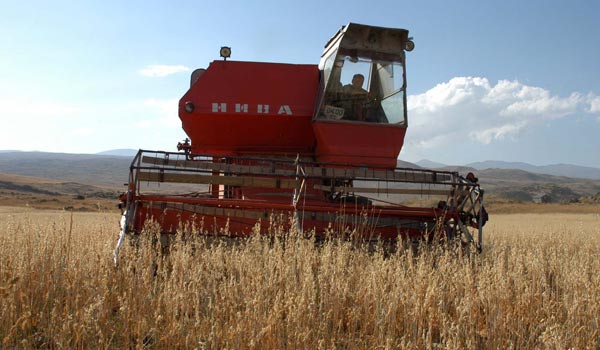
The preference of buying the agricultural machinery, bought by the $2 million grant provided within the framework of the Japanese government’s ‘Grant Aid for Struggling Farmers’ program, will be given to the co-operatives which have a long-term work experience, and are located in border and high mountainous areas. Garnik Petrosyan, candidate of agricultural sciences, who has a rich experience in the sphere, told ArmeniaNow that this process is a quite productive way of renewing the current agricultural machinery which is inherited from the Soviet period, and is in poor condition.
“Many seek to buy that machinery, because the government buys it by a grant and sells at low prices – twice less expensive. The most important point is that this way the government tries to rouse interest in villagers and help them develop cooperation because this is the only real opportunity for the development of our [Armenian] agriculture,” Petrosyan says.
Within the framework of the development program of border Pambak village, Gegharkunik province, a combine, a tractor and a plough were given to the village to cultivate the arable lands of the village and the region. Head of the program Ararat Yeritsyan says that it is a salvation for the village, because in this case their fellow-villagers cultivate their lands and collect their harvest at affordable prices.
“Because we have not bought this machinery, we must only pay taxes and salaries, and use the incomes for running the kindergarten of the village. We have defined a reasonable price for our villagers – 8,000 drams ($22) and 15 liters petrol per one hectare,” Yeritsyan says. “I must say this [the new agricultural machinery] is more favorable for villagers than the old machinery, which is broken, very often making the working process longer,” Yeritsyan adds.
The Ministry of Agriculture will put up at auction 61 tractors (about $11,000 each), 7 ploughs (about $2,200 each ), 3 mowing machines (about $9,500), and 3 wagons (about $2,700 each). According to Petrosyan, the agricultural machinery constantly given to farms by auctions is not enough yet. “The amount of the machinery is rather small yet, but it is a grant program, and the government does not have immense funds to provide a great amount at once.”
Source: http://armenianow.com/news/28007/armenian_government_agriculture_machinery
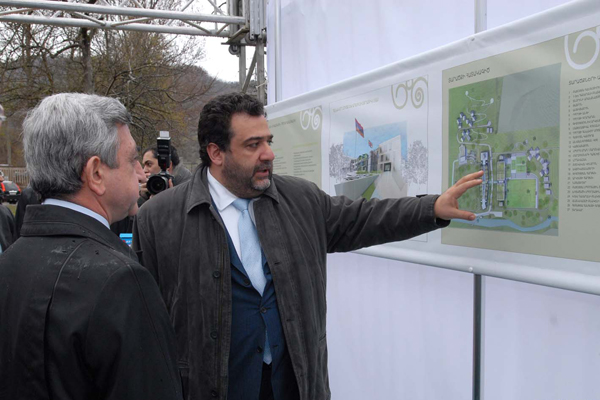
Vardanyan describes the project, which costs an estimated $35 million, as “ambitious”, a project that “will not be profit-making, but is a necessary investment for Armenia.” “There is no such school in the whole post Soviet territory and we’ve decided that if we are to do it, then we should do it at the highest level, that we will choose the best teachers from abroad, about 60 teachers, and the most effective curricula in order to give the best education possible,” says Vardanyan’s wife, member of the school’s Board of Trustees Veronika Zonabend.
The school complex, besides the four-storied building of a gymnasium and several residential cottages, will include two indoor and outdoor gyms, tennis courts, swimming pools, an indoor and outdoor concert hall for 600 spectators and orchards. President Serzh Sargsyan, who attended the groundbreaking ceremony on April 9, and together with Vardanyan planted the symbolic “tree of knowledge” in the school’s apple orchard, considers the project to be “unprecedented.”
“I am grateful to Mr. Vardanyan and his wife for initiating such an unprecedented project. We are a small nation and can have success only due to quality and it [quality] is possible to achieve through good education and knowledge,” said President Sargsyan. The teaching language for main subjects at school will be English. Not only Armenians, but also children of other nationalities will be invited to study there, according to Vardanyan. The businessman says the education quality at the school will be such that its graduates will be able to enter the world’s best universities.
The school is expected to open in September 2013, and the summer camp affiliated with the school will open in June the same year. “The idea of building the school emerged in a very simple way. Our children were growing up and we wished to send them to summer camps of Armenia so that their bonds with the Motherland became stronger. However, there was no establishment that would correspond to such international standards,” says Vardanyan. Zonabend adds that from the very beginning it was planned to establish a summer camp, however later they saw a demand for such a school.
“When we developed the business plan, we understood that huge construction work would be carried out and it will be used for only a few months, now we’ve learned also that many children from Armenia are sent to study at Regent’s School in Thailand and thought: ‘Why go to Thailand if we could provide the same or perhaps better quality here as well?’,” says Zonabend. The importance of the establishment of such a school is also emphasized by Education and Science Minister Armen Ashotyan. He describes the idea of establishing the school as “a display of great patriotism.”
According to the minister, a few dozen children a year are sent to study at similar schools in Europe; only last year 18 children left for Thailand to study at Regent’s School. The school, of course, will require a fee to study. The size of the fee has yet to be decided. But according to Zonabend, fees there will be a little lower than international fees for similar schools, about $10,000 a year. The school founders, at the same time, promise that a special charity foundation will be established to provide scholarships to talented children and the number of such pupils will make about 30 percent.
Source: http://www.armenianow.com/social/education/22226/international_school_in_dilijan_groundbreaking

Armenia Introduces Chess As Mandatory School Subject

Vachik Khachaturian, who has been teaching mathematics at school for years, decided to teach chess, too. He says the game is interesting and useful for his young students at Yerevan's Secondary School No. 125. "First of all, chess is a game and it is fun. At the same time, it is an intellectual game," Khachaturian says. "Along with mastering the game the children learn to think independently. This [independence] makes the game interesting for them, especially at their young age." Armenia already is one of the world's leading chess nations. The country boasts more than 30 grandmasters and gold-medal winners at the International Chess Olympiads in 2006 and 2008.
President Serzh Sarkisian presides over Armenia's Chess Academy and the national Chess Federation. He also has been involved during the past three years in developing the plan to teach chess in the nation's schools. The director of Armenia's Chess Academy, grandmaster Smbat Lputian, initiated the project to introduce chess as a mandatory school subject. He says he strongly believes in the positive impact that playing chess can have upon children of a young age. "Chess is an amazing game, amazing as I see only positive things in it," Lputian says. "It is a very fair game and this is the most important thing."
Sitting amid chessboards in the academy's tournament room, Lputian explains that he sees chess as a way to develop the ability of children to think independently. "It makes you think and map out a strategy and while working on it, you need to assess your every move in advance and find the right one," Lputian says. "And with every move you need to make a decision, the whole game is about making decisions and these decisions should be primarily correct. The game makes you more accustomed to making serious decisions in difficult situations." Chess also is regarded by most Armenians as an inclusive and universal activity, capable of uniting people of different ages and physical abilities.
Nevertheless, the project has encountered some opposition in the former Soviet republic. Psychologist Ruzanna Gharibian is a supporter. She says playing chess helps the children not only to improve intellectual abilities, but also to develop essential personality characteristics that high-tech computer games are unable to provide. "You know it is much better to create an atmosphere of real moral victory [for a child] by giving them these chessmen rather than giving them a computer and letting them experience victory through different aggressive [computer] games," Gharibian says.
Gharibian says playing the game of chess helps children develop responsibility and accountability for their actions. "You make a move and you bear a certain responsibility for the move you made," Gharibian says. "While playing computer games, children do not feel responsibility for their actions." Studies conducted by Western scientists and chess masters in primary schools have confirmed that learning chess at an early age improves the reading performance of children, strengthens their problem solving skills, and has a positive effect on concentration, memory and calculation.
Source: http://www.rferl.org/content/armenia_introduces_chess_as_mandatory_school_subject/24333249.html
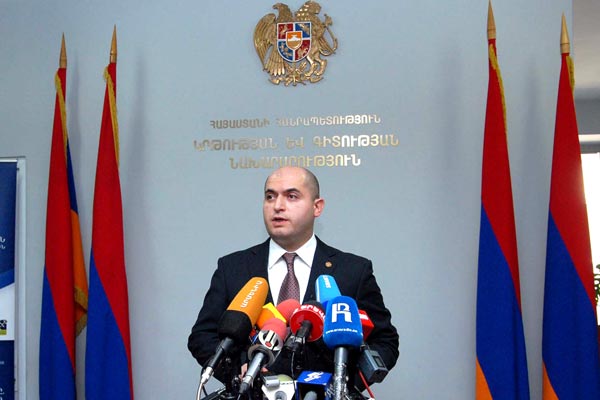
The test is written and oral, with the written part consisting of 800 questions referring to the Constitution of Armenia, the Labor Code of Armenia, as well as laws on education and children. Applicants answering correctly to at least 90 percent of the questions would be allowed to participate in the oral exam. Ruzanna Muradyan, head of the Education without Borders NGO, in charge of school principal training, says the exam would help them master the related legislative field, and it would make the school management process more productive.
“Of course, 800 questions are a lot, but if prepared, it is not an impossible task. For example, one of the principals, participants of the Friday exam, who had been trained at our organization got a 100 percent result,” Muradyan says. The applicants who successfully pass both written and oral exams, and receive the certificates, will have the right to participate in a competition for a headmaster vacancy at any school.
“I assure you this is one of the main tools which will give us an opportunity to improve the educational sector within the upcoming years, because school management problems are tightly connected with the quality of education and legitimacy now,” Minister of Science and Education of Armenia Armen Ashotyan said.
Anahit Bakhshyan, member of the NA Standing Committee on Education, who was at the exam on Friday, says that on that test day everything was held according to the plan, point by point, and with maximum transparency. “I must say this is laudable, because principals will have some knowledge about the legislation of their sphere [education],” Bakhshyan says.
Source: http://www.armenianow.com/social/education/27803/armenian_education_ministry_exam

“This service will attract passengers and create a healthy competition with motor transport,” Marat Khakov, the company’s first Deputy Director General, said at a press conference on Thursday. Passengers traveling by the commuter train will be offered additional services for their money, such as newspapers, refreshments, and others, he said. A normal ticket price for the transport four times a day will be 300 drams (about 80 cents). SCR also offers a “weekend” train for holidaymakers to the lakeside.
Yerevan-Shorzha will take passengers to the station on the eastern shore of Lake Sevan on Friday evenings and returns them on Sunday evenings (a one-way trip takes 3 h, 10 m). The ticket price per person will be 9,000 drams (or $25), which will include stay inside security-guarded carriages overnight.“This is a novelty. I think it will be in demand,” said Khakov.
SCR is a subsidiary of Russia’s state-run rail company, RZhD, that took over the Armenian network in early 2008 after signing a 30-year management contract with the Armenian government. The Russian company then pledged to invest a total of 74.5 billion drams (or about $206 million, according to the current exchange rate) into its Armenia operations, of which 59.3 billion drams (about $165 million) during the first five years of work.
In March, the Armenian government criticized the Russian operator over its failure to meet its investment obligations envisaged by the management contract prompting the latter’s assurances that the investment shortfall for 2008 would be eliminated in the course of 2009 in addition to the current year’s planned capital investment. SCR’s representative on Thursday also said that a train service between Yerevan and the Black Sea port of Batumi in Georgia, originally planned for launch on July 1, will become available beginning from July 15.
“The delay is due to some problems existing today between SCR and the Georgian Railway company,” Khakov explained. He said that due to investments made into railway infrastructure and safety standards, the time of travel on Yerevan-Batumi will be reduced by 80 minutes. Still the trip (leaving Yerevan at 10.00 p.m. and reaching Batumi at around 4.00 p.m. the next day) would take 18 hours. The same trip by bus takes about 11 hours.
Tickets will be available from 10,000 drams (about $28) and range to 21,000 drams (about $58). On board passengers will be offered meal, clean beddings, etc. Also, as announced, Gyumri-Vanadzor-Ayrum will become another direction that will be operated this year, and the travel time on several routes will be reduced. And Head of the SCR Directorate of Passenger Transportation Samvel Ghalechyan said that additional charges will be made for baggage transported on trains.
“The company is currently conducting work on legalizing transportation of baggage, in particular there will be a compulsory payment for baggage on all commuter trains,” he said. Ghalechyan added that the SCR transported 368,400 passengers in the five months of this year, which is a 30-40 percent increase over the volume of passenger transportation in Armenia during the same period of 2008.
Source: http://www.armenianow.com/news/10136/way_for_rail_armenia_getting_back
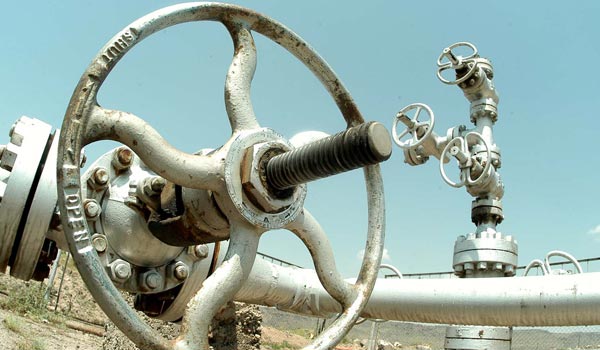
As to plans for the construction of an oil refinery in the territory of Armenia that have been discussed for several years, Golubev said the project has been put on hold because of its unprofitability. The press service of the Ministry of Energy and Natural Resources of Armenia earlier reported that a joint Armenian-Iranian task group was completing technical work on establishing the diameter of a future oil pipeline from the refinery in the Iranian city of Tabriz to the Armenian city of Yeraskh. Armenia, Iran and Russia take part in the pipeline construction. The estimated cost of the project is $200-$240 million, according to RIA Novosti.
Source: http://www.armenianow.com/economy/23423/armeniairan_gas_pipeline_construction

Source: http://asbarez.com/94532/gas-discount-for-poor-approved/

Shaboyan claimed that the company deliberately cut back on daily supplies of eggs to major retailers and sold some of its production to “unknown buyers” by “shadowy means” in late December. The levied fine represents two percent of Lusakert 2009 revenues.
Manase Yepremian, a Lusakert representative, blamed the egg crisis on increased consumer demand and said the ruling is based on “theoretical observations,” rather than concrete evidence. “Why would we create the deficit?” he told journalists. “To make extra profits? It has to be proved that the company has made such profits.” The SCPEC sanctions against Lusakert come on the heels of a call from Prime Minister Tigran Sargsyan for a stricter enforcement of Armenia’s antitrust laws.
Source: http://www.armenianow.com/economy/28663/armenia_egg_poultry_farm_fined
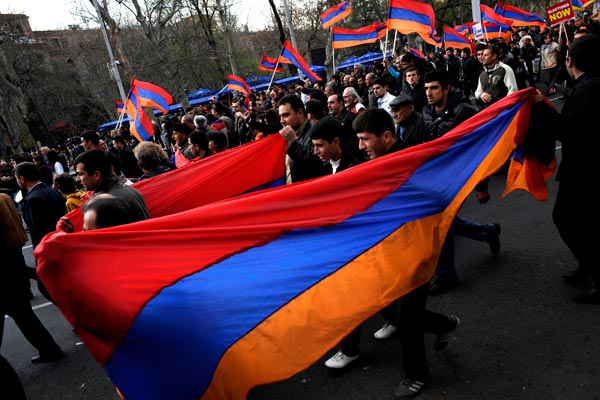
As to the crisis, the IMF official stated it did not enhance Armenia`s competitiveness, and Armenian products showed a 50% price rise. Following Mr. Tolosa`s address, Mr. Kapinos asked a question about Armenia`s major problems. Mr. Tolosa pointed out two kinds of problems: structural problems Armenia had before, and problems that arose later. Low-rate improvement of business environment seriously affects the Armenian economy, Tolosa said. Obviously, Mr. Kapinos was not satisfied with the IMF official`s answer. He asked one more question about the root of the problems. One of the foreign guests said that the problem may be the lack of democracy in Armenia or Armenia`s failing to reject Soviet standards. The IMF official said that Armenia will benefit from more balanced distribution of its resources.
Finally, Mr. Kapinos decided to answer is own questions. "The problems stem from the system formed in 1990s, namely, oligopoly," he said. Oligopolies are unlikely to come to an end themselves, so there is a need for external interference. The current system makes Armenia dependent on transfers and import. Mr. Kapinos arrived at the following conclusion: only programs envisaging system management reforms will change the situation in the country. The IMF is supporting the programs that will produce "evolutionary" results, Tolosa said. He reminded the participants of as rampant corruption in the United States in 1900s as it is in Armenia now.
Source: http://news.am/eng/news/50972.html

Armenian President Serzh Sarkisian visits a newly constructed building for young scientists in Yerevan on April 9
"For instance, we are ready to exempt [those manufacturers] from profit tax for three to four years and postpone the payment of value-added tax (VAT)," he said. "We are ready to give other assistance."
The government already selectively delays the collection of VAT from industrial equipment imported by local firms. This privilege is not automatic and has to be approved by the ministerial cabinet on a case-by-case basis. Under Armenian law, the rate of corporate income tax is fixed at 20 percent for all businesses. Many businesses, especially large and lucrative firms owned by tycoons with ties to the government, have long been suspected of underreporting their earnings. Proceeds from profit tax accounted for less than 15 percent of the government's total tax revenues last year.
Sarkisian met with entrepreneurs at one of three industrial enterprises in Yerevan that he visited on April 8. He has shown a keen interest in economic affairs in the past month, discussing them with central and regional government officials and inspecting businesses around the country. Some observers link this activity with renewed opposition demonstrations. Sarkisian told Prime Minister Tigran Sarkisian and other top officials on March 11 to adopt a more hands-on approach to economic development. He said it is essential for speeding up GDP growth and easing hardship in Armenia.
Source: http://www.rferl.org/content/armenia_sarkisian_tax_breaks/3552512.html
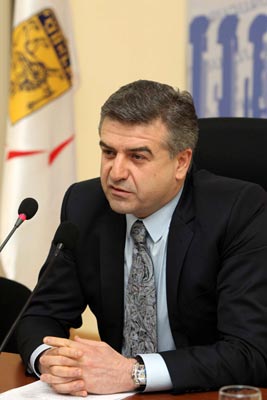
Presenting all spheres – education, healthcare, environment, collecting garbage, transportation, even cemeteries, the mayor stated that anyway business environments must be created, investments must be made, and profits must be expected. “For example, in case of collecting garbage, tenders will be announced. A concept paper has been drafted for transportation, as a result of which video cameras will be installed in 60 stations, mini-buses will be replaced by middle-sized and big busses, and the bus fare payment system will be changed in the near future,” Karapetyan said.
Since the very first days of his tenure Karapetyan banned open-air trade in Yerevan. Speaking about it, he said, “Change the law, allow open-air trade, the next day Yerevan will become a market. I believe that we did it right [banning the open-air trade], and we are going to be consistent.” Soon after Karapetyan’s decision all those merchants who deal with open-air trade organized pickets against his decision in front of the Government and National Assembly buildings, stating that they had been deprived of the only opportunity to earn their living.
Armenian mass media has especially criticized Karapetyan’s activity, when on his initiative Russian language courses were organized for 26 employees in 11 divisions of the City Hall. “Does the mayor of Yerevan also consider this to be his objective? Apparently, he is still closely associated with ArmRosGazprom and feels like a representative of the interests of the Russian company, more than of Yerevan citizens,” Armenian press wrote. Karapetyan was head of ArmRosGazprom Company before. He was elected mayor of Yerevan on December 17, 2010.
Source: http://armenianow.com/news/28987/yerevan_mayor_city_reforms
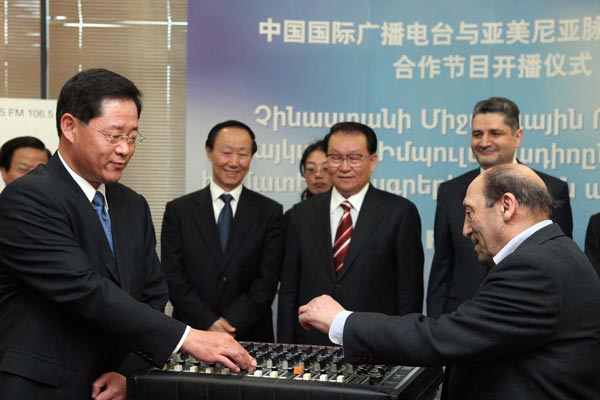
Source: http://armenianow.com/news/28950/armenia_china_radio
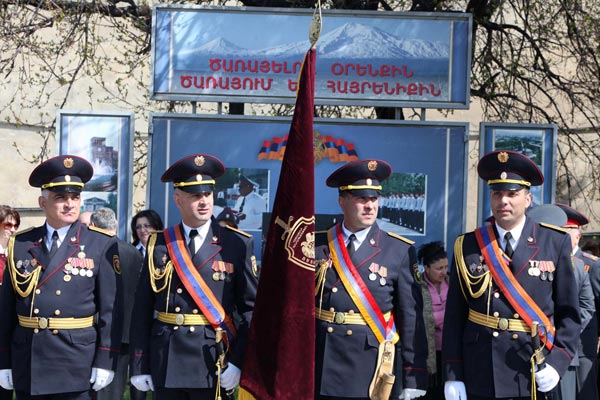
The reforms will be directed at removing corrupt officers, who too often have drawn out charges in order to extract a bribe from crime suspects or from motorists. “Now we will create concrete terms. There will be no room for procrastination soon after the first words, the first contact [between citizens and law enforcers],” Sargsyan said. As part of the police “clean up”, the Government this week approved new uniforms for police which the chief says will improve officers’ images.
“If since now many people have seen only violence, power, etc. in a policeman, then now after wearing this uniform our behavior has changed a lot, many things will be changed. People will become closer to us, they will trust us, will communicate with us, will contact us, they will perceive us as colleagues, as representatives of their nation, as sons of their nation,” Sargsyan said.
Source: http://armenianow.com/news/29046/armenia_police_reform
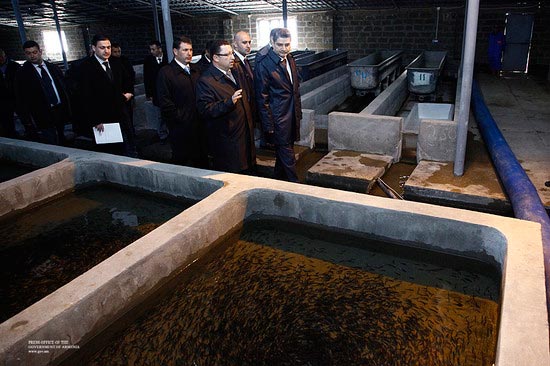
In 2011, the volume of fish exports from Armenia will be doubled to hit the mark of at least 800 tons, said Prime Minister Tigran Sargsyan on Wednesday during a visit to Unifish, a fish-breeding company, in the country’s Ararat province. Studying the industry “it becomes clear that exports can be increased,” said Sargsyan. Addressing the subject of installation of water meters, the prime minister said: “Both we and fish farms will have a peace of mind, as the calculation of the used water will be carried out properly. Such complex farms simply require the installation of water metering devices.” In February the Armenian government held consultations on the activities of fish farms in the country. Minister of Nature Protection Aram Harutyunyan said a relevant monitoring had revealed that no water measuring devices had been installed in fisheries. Fish farmers, in their turn, voiced their strong protest in regards to the government’s decision to install water meters, expressing concern about possible risks.
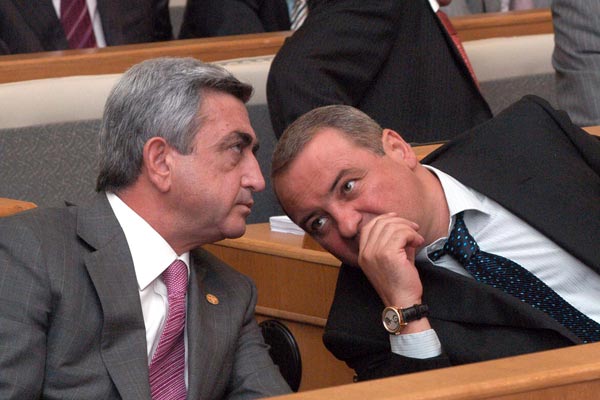
Partly this is confirmed by a U.S. Embassy worker’s cable published by the whistleblower site Wikileaks which says that during a meeting with the U.S. charge d’affaires in Yerevan in 2008 Minasyan said that Serzh Sargsyan would like to be obliged to young people, rather than “old thugs”, implying the oligarchs. Given that Karen Karapetyan’s brother is a major Russian businessman, Samvel Karapetyan, and has an enormous political and economic clout both in Russia and Armenia, newspapers argue that Karapetyan had to go because of his excessive conservatism as far as oligarchy is concerned.
The death of Azaryan, who died at age 50, also became symptomatic. In Armenia, an attempt is being made to pass on to normal – fair and transparent – electoral processes. The main opposition Armenian National Congress (ANC), which continues to insist on holding early parliamentary and presidential elections, promises to do everything for the elections to be held within riggings. The Armenian Revolutionary Federation (ARF Dashnaktsutyun) has already launched the project “Vote is Power”, under which it carries out all sorts of actions aimed at ensuring the fairness of the coming polls.
Against this background the re-election of Azaryan, who is accused by the opposition of standing behind the vote riggings in the past two general elections, as head election official in July caused a disappointment. And analysts began to say that the government was not going to change anything and that the elections would be rigged again. Azaryan’s untimely death will bring to the fore the question of the personality of the new CEC chairman. And depending on who will be elected to this position, it will be possible to judge whether the government is ready to open competition in the course of the upcoming elections.
That early elections are near in sight is testified by the ANC’s changing its tactics. Opposition leaders stated that the ANC passes on to a rally campaign to get, under the pressure of masses, the holding of snap elections. The next opposition rally is scheduled for September 23. Though, ANC leader Levon Ter-Petrosyan did not rule out that the formal dialogue between the ANC and the ruling coalition suspended over the arrest of an opposition youth may be renewed. Still, it is unlikely that the faulty electoral system or the faltering modernization depended only on Garegin Azaryan and Karen Karapetyan. Therefore, new personnel changes are being expected in Armenia.

The SIS evoked the same articles of the Criminal Code when it arrested another traffic police colonel, Stepan Karakhanian, on Friday. The agency subordinate to state prosecutors accused him of embezzling more than 150 tons of fuel that was allotted to police cars.A police source told RFE/RL’s Armenian service (Azatutyun.am) that Karakhanian was released from custody pending investigation on Tuesday. The SIS also announced a separate criminal investigation into what it called a sale of driver licenses by “certain officials from the road police.” It has not arrested or named any of those officials so far. It is not yet clear if Ohanian and Karakhanian will plead guilty to the accusations.
The chief of Armenia’s national police service, Lieutenant-General Alik Sargsian, pointedly declined to rule out Ohanian’s sacking last Thursday. Speaking to journalists, Sargsian said that the road police chief will have to “give answers just like other citizens” if investigators conclude that he personally benefited from the allegedly stolen fuel. Although the road police have undergone major structural and other changes in recent years, corrupt practices within their ranks are believed to remain widespread.
In what it portrayed as yet another anti-corruption measure, the Armenian government announced last month that the police will start installing soon first-ever speed cameras at major street intersections in Yerevan and highways across the country. Their total number is to reach 280 by 2017.
President Serzh Sarkisian called on Armenian’s leading and often mutually antagonistic political forces to work together in meeting serious challengers facing the country as he celebrated the upcoming 20th anniversary of its independence late on Tuesday. Speaking at an official reception in Yerevan attended by politicians and public figures, Sarkisian stressed the importance of creating “the atmosphere of trust in our country.”
“For two decades we have been working toward the establishment in our country of a political culture based on competition,” he said. “However, political competition cannot direct a country toward the best course, if the ends of those competing are subordinate to the means, or when the ends justify the means, if they compete for sake of competing, if they win for the sake of winning,” continued Sarkisian.
“Therefore, political competition ought to go hand in hand with political cooperation. The joint path of competition and cooperation is narrow indeed; it is also unsteady, while the rims of the nation-racking abyss are wide, numerous and slippery.”
The remarks are likely to be dismissed by major opposition groups and some civil society representatives who have challenged Sarkisian’s domestic legitimacy ever since the disputed 2008 presidential election that brought him to power. They say that the Armenian authorities themselves fuel tensions in the county by falsifying elections and abusing human rights.
The main opposition Armenian National Congress (HAK) insists that Sarkisian’s resignation and the holding of early presidential and parliamentary elections is the only way of ending those tensions. In his speech, Sarkisian made no mention of his administration’s dialogue with the HAK, which began in July but was frozen last month because of the controversial arrest of an opposition activist. He praised instead the presidential Public Council, an advisory body comprising politicians and public figures loyal to the Armenian government.
Sarkisian also spoke of “the maturity of our state” gained over the past two decades. “We have been able not only to lay the foundation of our statehood but also to start the construction of a strong edifice,” he said. “Our political parties and society have been able to mature passing a very difficult road, to find the path of political competition and cooperation and move forward.”
Source: http://www.azatutyun.am/content/article/24328597.html
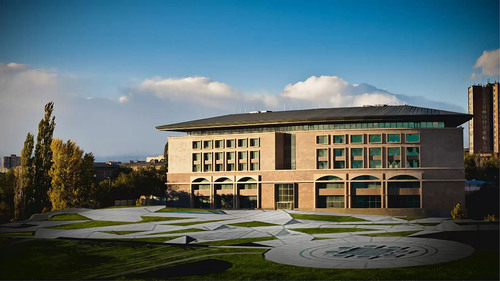
On Monday, August 14, the Tumo Center for Creative Technologies officially opened to the public, but on, Friday, August 12, the public got a taste of the state-of-the-art facility during the opening ceremonies, which were streamed live on the center’s website. Founded by AGBU Central Board member Sam Simonian and his wife, Sylva, Tumo is located in Yerevan’s Ajapniak neighborhood and it is designed to introduce students, ages 12 to 18, to a professional level of instruction in animation, web development, video game design and digital video/audio through extensive after-school programs. Designed to serve 1,000 students a day, the 75,000-square-foot facility will offer students in Armenia access to the latest technology and a universe of innovative ideas.
“Teamwork, communication, Internet literacy, analytical thinking, initiative — these are the skills that will be taught at Tumo,” says Sylva Simonian. “Sure, the kids may come to learn how to create a video game, or build a better website — and have fun in the process – but they’ll leave with so much more.” “Creativity is a key component in the success of any endeavor,” Sam Simonian says. “Kids attending Tumo are likely to be working in fields that don’t even exist yet. But the skills, and creative ways of solving problems they’ll learn at Tumo, will serve them well as they make their own contributions to the world in the years ahead.”
To learn more or watch the opening ceremonies, visit tumo.org.
Source: http://www.mirrorspectator.com/2011/08/19/tumo-center-opens-in-yerevan/\
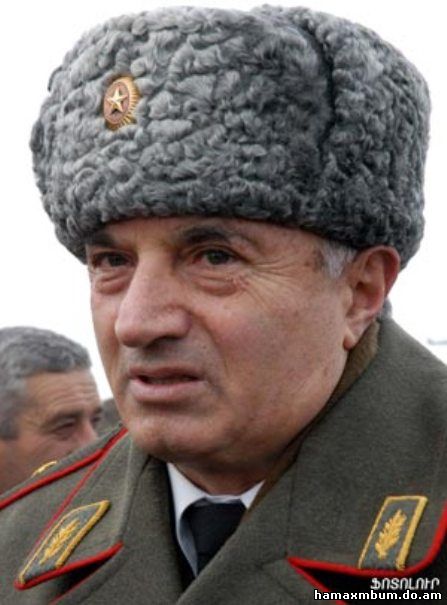
Source: http://news.am/eng/news/74515.html
A fraction of those manuscripts dating back to medieval times is put on display at a museum operating within the old Matenadaran building which is perched on a hillside overlooking downtown Yerevan. The Armenian government initiated in early 2008 the $14 million construction of a new building adjacent to the existing one. It will now house the manuscript repository itself as well as other facilities of the institute employing hundreds of people.
The project was financed by Russian-Armenian businessman Sergei Hambardzumian and Maxim Hakobian, a major shareholder in Armenia’s largest mining company. They donated $10 million and $4 million respectively. Sarkisian paid tribute to both businessmen as well as Artur Meschian, a prominent Armenian musician and architect who designed the building, in a speech at the inauguration ceremony. Catholicos Garegin II, the supreme head of the Armenian Apostolic Church, and Catholicos Aram I, the number two figure in the church hierarchy, then consecrated the building in a joint prayer service. The new structure is equipped with a high-tech laboratory to preserve, restore and digitize manuscripts.
“This is one of the most important events taking place within the framework of the celebrations of the republic’s 20th anniversary,” Hrachya Tamrazian, the Matenadaran director, told RFE/RL’s Armenian service (Azatutyun.am). He said it is “opening up huge possibilities for internationalizing Matenadaran’s scientific activities.” Tamrazian also emphasized the fact that the reconstruction will lead to a major expansion of the manuscript museum. The Matenadaran’s entire old building, constructed in 1957, will be used for permanent exhibitions, he said. “It will become one of the world’s unique museums,” added Tamrazian.
Source: http://www.azatutyun.am/content/article/24334651.html
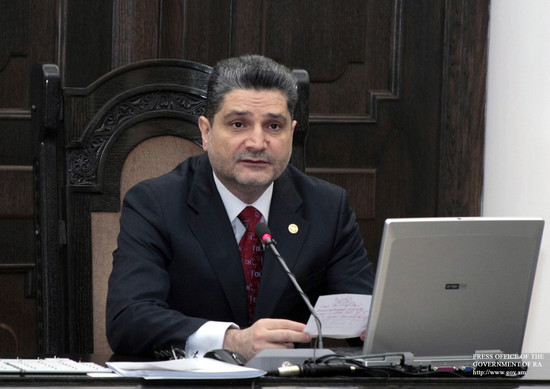
“The Armenian Government sees the economic future of our country in the development of the human potential and a competitive civil society,” the Prime Minister said. According to him, the development of the field of education has been one of the priorities of the past 20 years and the reforms implemented in the sphere are targeted at the improvement of the educational system. “We must be aware that we comprise part of the international social-cultural system, and the cooperation in the field of education is one of the important factors of peaceful and steady development of a democratic country,” the said.
“We are confident that by 2020 we’ll manage to establish a high-quality and competitive educational system corresponding to all international demands. At the same time we hope to become a worthy partner of the European educational system,” the Prime Minister concluded.
Source: http://www.armradio.am/eng/news/?part=soc&id=20901
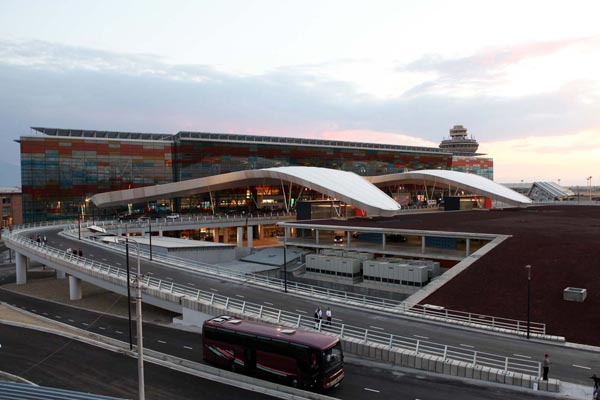
“The main goal of the project is to double the airport’s existing capacity and complete the new complex. Thus, Zvartnots Airport that has operated since 1961 is being brought into conformity with international class B, which is the highest class in the South Caucasus,” said Gevorgyan at the opening ceremony, stressing that the new complex offers all modern conditions for citizens and guests of Armenia. The deputy prime minister added that the complex’s arrival and departure halls will be the best in the region in terms of their technical equipment. “There is no doubt that the project will be a major boost to tourism development, as well as for turning Armenia into a major center for transit passengers in the region. Besides, the new complex and an emerging new economic environment around it will have a significant impact on Armenia’s economic progress,” Gevorgyan emphasized.
According to Argentinean-Armenian businessman Eduardo Eurnekian, who heads the Corporacion America SA group that manages Zvartnots, a well-equipped airport is a necessity for Armenia’s survival. “In 1991, I could not even imagine my involvement in this program, which has a unique national importance,” said the affluent Diaspora representative. “My investments have been made all over the world, but I’ve never felt the delight like I do in Armenia,” added Eurnekian, promising to continue investments in Armenia and Nagorno-Karabakh. The construction of the new terminal’s arrival and departure halls and a car park took place in 2008-2011. The complex occupies a space of 34,000 square meters, while the new parking area meant for 600 cars is situated on 20,000 square meters.
The Armenia International Airports company that took up the management of Zvartnots in 2002 has already invested $480 million in the building of the new complex and modernization of airport infrastructure. Due to this investment the airport is capable of serving 3.5 million passengers a year, more than double the number of passengers it could serve in the past (1.6 million). Now it also can handle 2,800 baggage pieces per hour. The complex built according to the design of the international airport in Vancouver, Canada, will be fully put into operation in October.
Source: http://armenianow.com/news/31845/new_terminal_zvartnots_airport
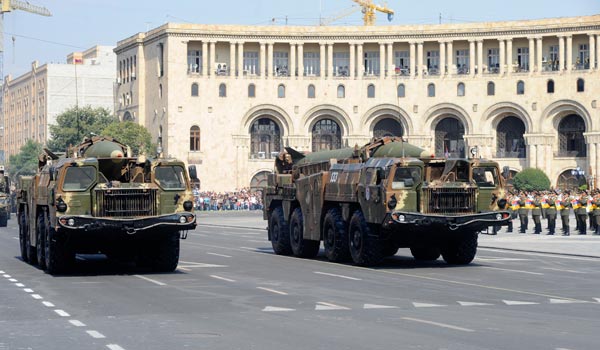
The fifth military parade devoted to the 20th anniversary of Independent Armenia featuring 4,000 marching troops and 3,000 pieces of armored hardware created a festive, high spirit and combat-ready atmosphere in the Armenian capital on September 21. For the first time demonstrated was the military technology that can reach target deep in the enemy territory and with high precision. Military expert Artsrun Hovhannisyan said in this connection, though, that the parade was not pursuing a quantity show-off, and as such it should not be compared to the Azeri arms and armament; the parade, he stressed again, was not meant as a show-off. “If Azerbaijan by its annual parade, with more headcount and equipment, seeks PR and tries to prove something to the world and to its people, Armenia does not have the same urge,” says the expert.
The parade featured exclusive military technology, such as artillery fire control and reconnaissance systems, trench mortar volley systems. Hovhannisyan says that some of the anti-aircraft defense systems were of domestic production or updated derivatives. Among the displayed tactical missiles, were 120-km range ones as well as 9K78 tactical ballistic missile derivative of “Elbrus” (also known under its NATO name of Scud), which is being further developed in Armenia to reach a greater precision. “This missile has a 300-km range that can reach any target in Azerbaijan. It is exceptional in its tactical features, and the only operators of such missiles in the region are Iran and Armenia. For the first time we have displayed qualitative characteristics,” says Hovhannisyan.
Referring to the parade march (defile) by the honor guards drill team at the end of the event, he defined it as astonishing and said that not all countries succeed in displaying such a drill, which speaks volumes about the soldiers’ discipline. “A parade does not illustrate the army’s total combat power, rather displays drill readiness, that is: how disciplined soldiers are. No parade is designated to show the full level of combat-capacity,” he stresses. Hovhannisyan points out that freedom fighters’ and clergymen’s presence in Republic Square was very important, as they symbolize the strength of the army and the high spirit of people’s combat-readiness.
Soldiers of Russian military unit N102 took part in the parade, too. As press secretary of the Defense Ministry David Karapetyan said in an interview with Radio Free Europe/Radio Liberty’s Armenian service (Azatutyun), because the military unit has an active part in ensuring Armenia’s security, the detachment’s participation symbolizes the deep roots of Armenian-Russian cooperation in the field of defense. “There is no ground for speculations,” he said. However, the opposition sharply criticized the Russian soldiers’ participation.
Heritage parliamentary faction member, MP Larisa Alaverdyan says in this connection: “They are working here, aren’t they. It’s their job; it’s a contract-based employment, so why should they participate in the parade? It doesn’t make sense; it can be explained, but not accepted. If the point was to show to neighbor countries that we are not alone on festive days either, that’s a different issue, however, still not acceptable. We have to not only gain independence, but also free our souls of this serfdom, and rid our perceptions off the image of a mighty partner.”
Armenian Revolutionary Federation Dashnaktsutyun faction member Lilit Galstyan believes that in order for the country to be on a leveled strong backbone, it has to be strong from the inside, but when the country is vulnerable it turns to “wedding generals”. (Old Russian custom when a general was invited to a merchant’s wedding to make it look more prominent). According to Heritage’s Alaverdyan, vulnerability has always been an issue for independent Armenia that started with the first president, increased with the second, and keeps growing now with the third. “If it keeps going the way it has, maintaining our absolute value is going to become very costly,” she says.
Source: http://www.armenianow.com/news/31886/armenia_military_potential

In the cable, which WikiLeaks recently made public, Bass states that Vashadze “reiterated past notice of concern that the Armenians have requested more than 500 overflights for 2010, essentially a ten-fold increase over last year. Vashadze stressed that Georgia has not agreed to the entire volume of flights for 2010, but has agreed to continue overflights through the next month. Vashadze shared an internal Georgian Ministry of Defense report detailing the contents of one recent shipment as evidence of the GoG’s [Government of Georgia] concerns… Vashadze expressed concern that the amount of arms flowing into Armenia could further destabilize the region.”
The foreign minister also said that Georgia would have to reconsider its permission for overflights. “The FM said that between the weapons sold to Azerbaijan and now the weapons being shipped to Armenia, he fears that disagreements over Nagorno-Karabakh could quickly escalate. Georgia is worried that the Russians are using these overflights as a way to increase capabilities at Gyumri. This would allow the Russians to squeeze the Georgians from the North and South, if they so chose,” reads the cable.
Vashadze also touched upon Azerbaijan’s reaction to the Russian shipments into Armenia. “He said that while the Georgians don’t want to get in the middle, they are concerned about balancing the neighbors. He said that at some point soon Azerbaijan will start to question the large number of overflights and wonder what is being shipped to Armenia,” writes Bass. The cable concludes with Bass requesting an assessment, “through appropriate channels,” of what the US knows or thinks it knows about Armenia’s acquisition strategy and “the extent to which these shipments are destined for them or others.”

The US former Ambassador to Armenia John Evans has not been to Armenia for already five years. Now he arrived in Yerevan and participated in discussion named “20 years of independence in Armenia and the region” in Civilitas foundation. He is surprised with the scene he saw. “I see serious reforms in the capital city. I open “Yellow Pages” and I am amazed, you have opened so many organizations during these years”, he said during the meeting. According to him there are also some lacks, but it is normal for every country, including the USA as well. "200 years have passed since the USA has accepted the Constitution but still there are some arguing issues. I see large reforms in Armenia. I did not have opportunity to visit Armenia regions, villages but I have seen the results of Millennium Challenges program” Evans added.
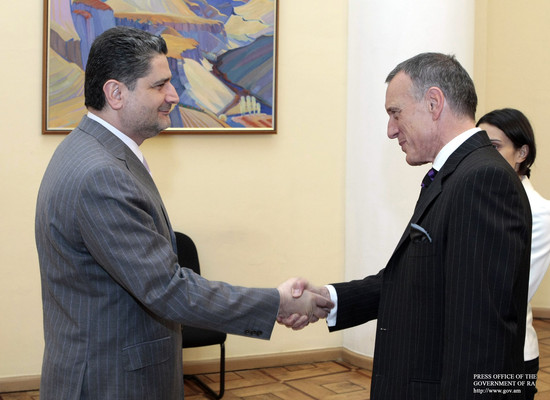
German Ambassador to Armenia Hans-Jochen Schmidt has said on Tuesday in a discussion on 20 years of independence in Armenia and in the region that both Armenian former presidents should hold responsibility for the situation in the country, “including the negative steps.” In this context the German Ambassador was asked if it’s accurate when the former authorities condemn the ruling government. Mr. Schmidt has said he’s attending the ANC demonstrations in the Liberty Square, but at the same time he avoids interfering the ongoing discussions. “In a meeting with one of the advisors of the first president I asked if in 94-97 elections were not forged, he said that I knew nothing about them. Of course, I think it’s unfair. But they cannot admit their own mistakes.” “Nobody likes the words oligopoly or oligarchy but those phenomena appeared during the former governments,” concluded the German diplomat.
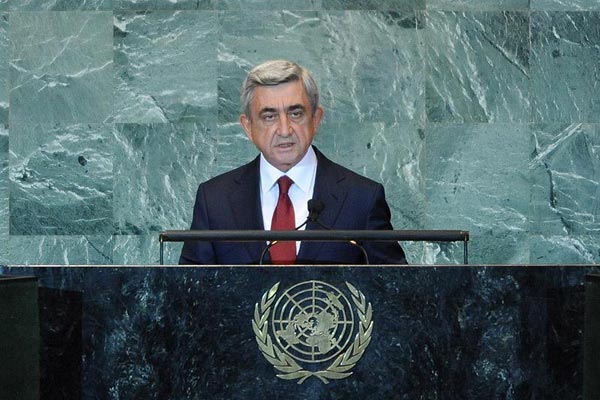
Armenian President Serzh Sargsyan on Friday delivered a speech at the 66th session of the United Nations General Assembly in which he, in particular, spoke about the Karabakh peace process and the recent Armenian-Turkish normalization efforts. In his far-ranging remarks from the high tribune, the Armenian leader effectively accused Azerbaijan and Turkey of impeding progress in both processes. “Azerbaijan’s utter unwillingness to reach an agreement and its ‘everything or war’ position have stalled progress in the peace talks. Despite the expectations and the high-level advice from the international community, Azerbaijan took yet another step back during the last meeting in Kazan by rejecting the previously elaborated arrangement and trying, in fact, to break down the negotiation process,” Sargsyan, in particular, said in reference to the latest developments in the internationally mediated peace talks. Regarding the unsuccessful attempt of recent years at a rapprochement with Turkey, the Armenian head of state again accused Ankara of “aborting” the ratification and implementation of the normalization protocols initialed in 2009. He also stressed that Turkey continues to engage in a policy of denying the Ottoman-era genocide of Armenians.
Read President Serzh Sargsyan’s full speech at the UN in English here: http://www.president.am/events/news/eng/?id=1799 And in Armenian here: http://www.president.am/events/news/arm/?id=1799

Dear Compatriots, Ladies and Gentlemen:
Thank you.
Source: http://asbarez.com/98318/sarkisian-visits-southland/comment-page-1/#comment-2639683
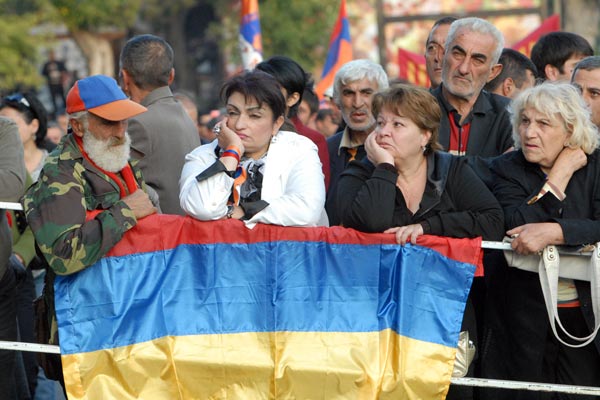
This constricted, mountainous country, where winters can be bone-chilling cold, has little arable land but is home to some 3 million souls.
In the past quarter century the country has gone through tumultuous times: it has experienced a massive earthquake (25,000 killed and many more injured and left homeless); it has witnessed the collapse of the 15-member union it was a part of; has been dragged into war; has provided sanctuary to fellow nationals who had fled persecution and worse by a war-mongering neighbour. Another shock this venerable country has undergone is the forced 180-degree turn in its political-economic-cultural orientation as it has switched from communism to capitalism.
The above tribulations have so far failed to shake the country’s determination to move forward. Luckily, it’s not all doom and gloom in this land where God, according to religious tradition, decided to give humanity a second chance by navigating Noah’s Ark to land on a nearby majestic mountain.
Among the blessings of the country are its bright, educated, sophisticated, and hard-working citizens who are immensely patriotic. Another boon is its Diaspora of nearly 6 million people. And more importantly, the overwhelming majority of Diasporans retain an abiding love for their motherland and help her financially, politically, morally, and in the knowledge industries.
However, in recent years there has materialized in Diaspora a tendency to throw indiscriminate darts at the motherland. The motivations of the Diasporan “Let’s Bash Armenia” crowd are not difficult to fathom. They are mostly well-intentioned people who want to see an affluent, accountable, corruption-free, democratic Armenia ASAP. Others rightly believe a lagging Armenia is detrimental to the well-being of its citizenry and impels many to emigrate. A third group identifies with Armenia so strongly that seeing a less-than-a-perfect homeland is a personal affront to them—resulting in uncalled for bruised egos. Seemingly minimizing the impact of the hits Armenia has absorbed even before its independence in 1991, these critics claim that two decades are more than sufficient for Armenia to have shaken off the cobwebs and miasma of the “bad, old, desultory” Soviet days.
Predictably, the “Let’s Bash Armenia” group suffers from the “sky is falling” Chicken Little paranoia. In their wisdom, these chattering classes also accuse Diasporans supporting Armenia of blind patriotism.
To borrow the title of immortal Khachadoor Apovian’s masterpiece—“Verk Hayasdani” (Wounds of Armenia), the “verks” of our motherland are many. We all know what they are. But rather than incessantly slamming their Lilliputian homeland, these armchair diplomats, politicians, economists, generals, human rights promoters… should consider some facts.
It’s easier to find the proverbial needle in the haystack than to find an instance when Diasporan critique had a crucial impact on the government of Armenia. To criticize Serzh Sargsyan and Co. is pointless, if not self-defeating. Since Yerevan is obdurate about conceding to Diaspora criticism, it’s a waste of breath to dispatch unsolicited advice to Armenia from 8,000 miles away.
Unlike brickbats, positive Diaspora contributions do have an impact on Armenia. So why not invest our energies in these beneficial efforts?
When the last Armenian kingdom expired in 1375 (by then shrunken to a city-state called Sis and ruled by a monarch who had more French than Armenian blood in his veins), our nation had to wait 600 years to have a state again. Let’s support our precious and imperiled Armenia.
Let’s support it because it’s our homeland.
Let’s support it because it needs our support.
Let’ support it because our support does make a difference.
When we incessantly criticize the Yerevan government, we also hurt the morale of the citizens of Armenia and Artsakh. When we criticize Armenia, our words bounce back and demoralize Diasporan youth—our children who, like us, do daily battle to remain Armenian in these “odar aperoun” (foreign coasts). What kind of example, encouragement, message, and inspiration do we provide to our young when we viciously, virulently attack the Armenian government and even Armenia’s citizens for their shortcomings?
The bête noire of the “Let’s Bash Armenia” subscribers is the corruption of the RoA government. They are correct in perceiving corruption as an obstacle to the well-being and advancement of Armenia. But to lend some perspective to the corruption issue, critics should consider these numbers. According to NationMaster.com Corruption Index, Armenia is number 88 among 159 countries. Nation.Master.com’s index is based on data from the CIA World Factbook, the United Nations, and the Organization of Economic Co-operation and Development. Apart from Latvia, Lithuania and Estonia (all in Western Europe), Armenia has the lowest corruption standing among the former Soviet republics.
Among the former Soviet republics, Kazakhstan is the closest to Armenia, holding position number 107. The Russian Federation is a distant 127; Georgia and Kyrgyzstan, 131; Uzbekistan and Azerbaijan, 138; Tajikistan, 145. At 156, Turkmenistan is near the bottom.
Meanwhile, the influential American "Foreign Policy" magazine recently ranked Armenia 101 out of 177 in its Failed States Index 2010. The study, done in cooperation with The Fund for Peace public organization, placed Norway, Finland and Sweden 177, 176, 175 respectively as the most stable countries. Azerbaijan, Georgia and Iran ranked 55th, 37th and 32nd, respectively among countries in danger. Uzbekistan (36th) and Tajikistan (38th) were the most vulnerable countries among the former Soviet republics. The Fund for Peace uses its Conflict Assessment System Tool to compile and measure its data.
During the Vietnam War, some Americans used to wear “America—Love It Or Leave It” pins. Sometimes we are tempted to snatch that extreme slogan, turn it around, and tell our amateur consultants, “If you care so much about Armenia, why don’t you pack up and move to Armenia?” But most of the time we restrain that temptation.
Although Armenians have been around for at least 4,250 years, RoA is a young country. It is not strong, affluent and secure like America, Australia, Canada or France, where so many Diaspora Armenians live. It can’t afford the luxury of 24/7 criticism, which for most developed nations, is a fact of life. As well, nation building--while ones existence is threatened--is no job for boys or for intellectual dilettantes, or people who use the Internet as free therapy.
If you can’t help Armenia in these difficult times, keep your counsel. Please don’t pick the scabs of Verk Hayastani.
Source: http://www.keghart.com/Editorial_AmateurExperts






"The most important item on the Armenian president's to do list has to be the addressing of Armenia's parasitical and monopolistic oligarchy. Armenia's all powerful oligarchs, the ruthless peasantry that became fabulously wealthy during the post-Soviet years of unbridled crony capitalism need to be reined in. I believe this will happen in time. President Sargsyan has proven himself to be a grossmeister of politics, both foreign and domestic. He has not only outsmarted the nation's problematic opposition, he has also outsmarted Armenia's antagonist on the global stage by brilliant political maneuverings. I believe sooner-or-later he or his successor (which will more-or-less be from the same clique) will manage to outsmart Armenia's all-powerful businessmen as well. If Armenia is to accelerate its forward progression it must curb its gluttonous businessmen. "
ReplyDeleteDo you think that Sargsyan has the power of making this a reality? Even his brother is an oligarch, it would be really hard for him
The short answer is no. President Sargsyan does not have the adequate power in a nation run by very powerful families. Having said that, it can be argued that Armenia's oligarchs are not as aggressive as they used to be or as flagrant in their illegal activities. It can also be argued that the rule of law and order in Armenia is better today than it was in the past. I think President Sargsyan deserves at least some credit for this.
ReplyDeletePS: I have said on many occasions that one of the president's vulnerabilities is his brother. I know from sources that the president has had problem with his brother but he has not done enough to stop his brother from making him look bad.